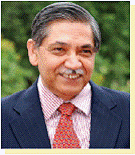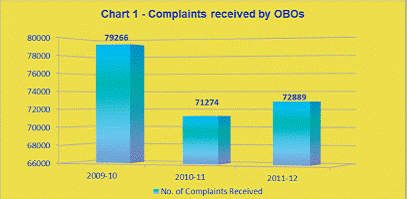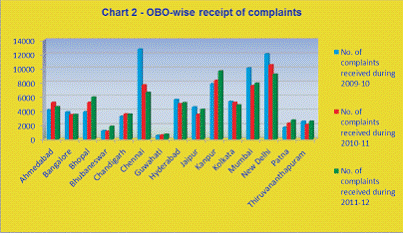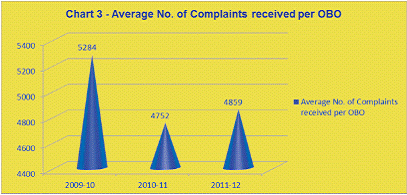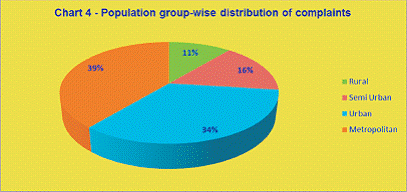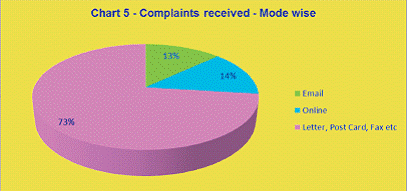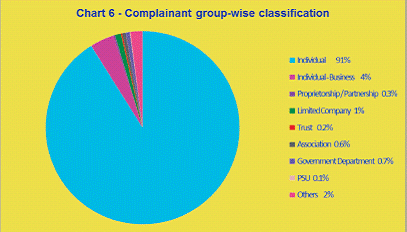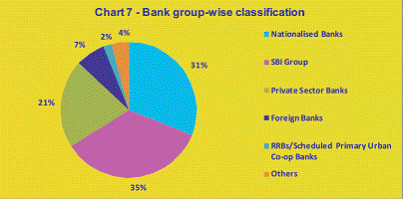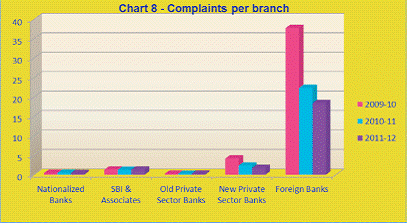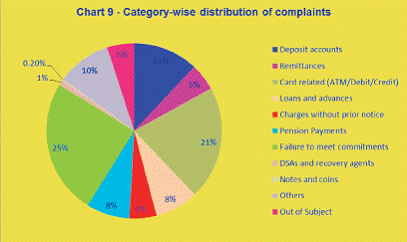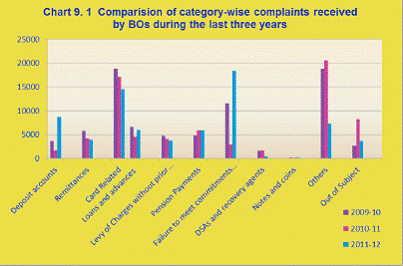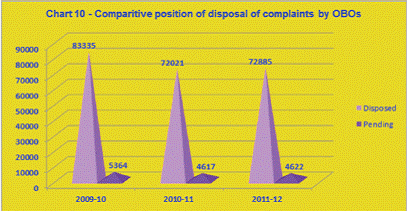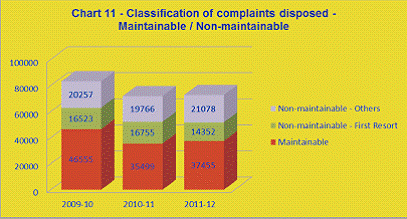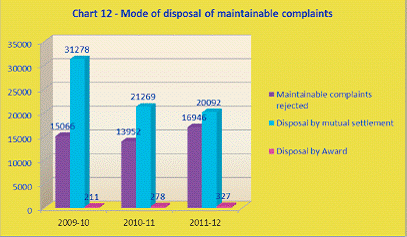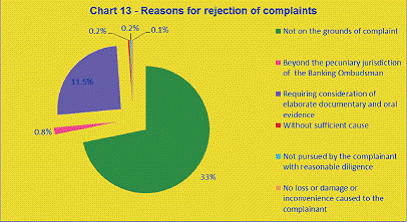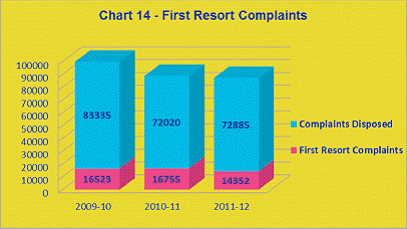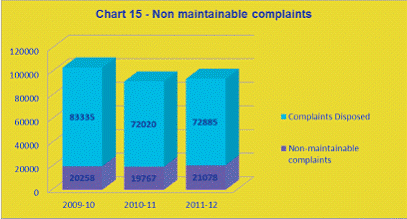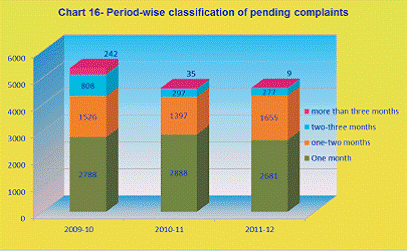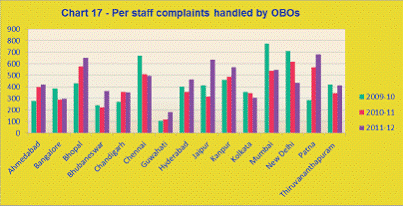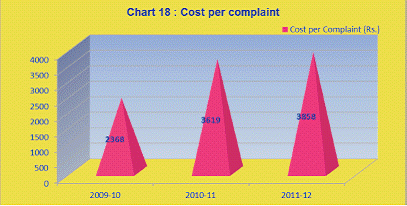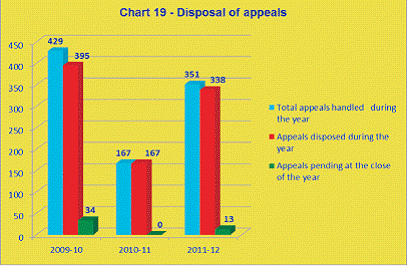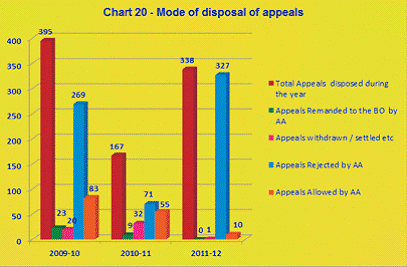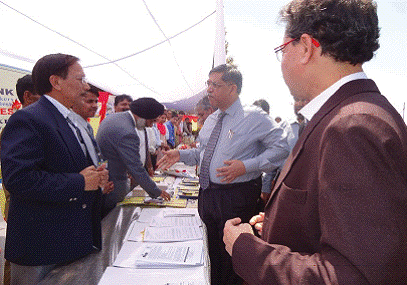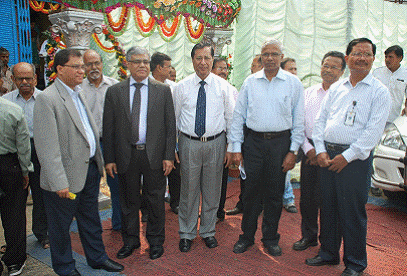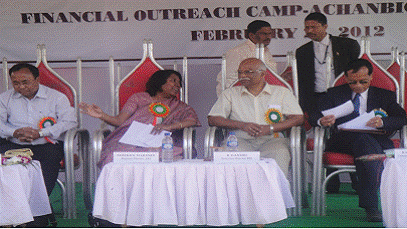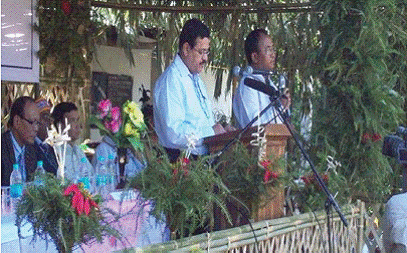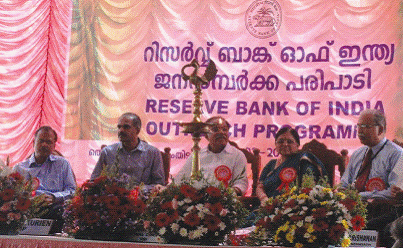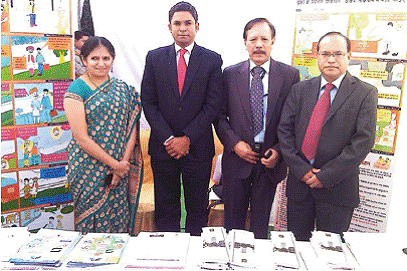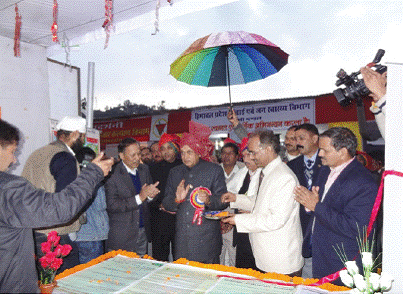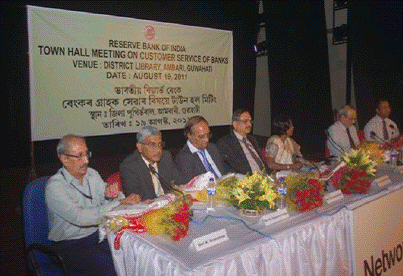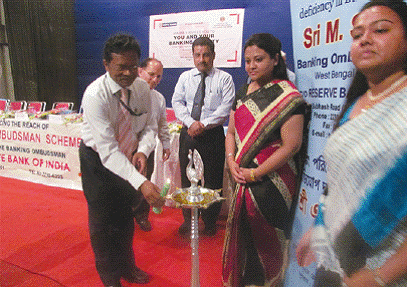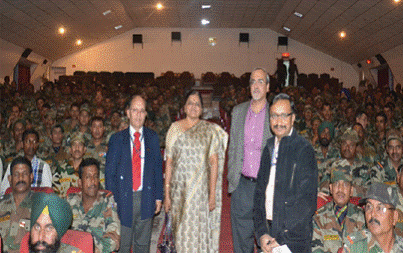 IST,
IST,
Annual Report on Banking Ombudsman Scheme, 2011-12
1. Consumer protection is not only about protecting consumers from bad decisions but also about enabling consumers to make informed decisions in a market place free of deception and misuse. Financial education, financial literacy and consumer protection policies should form the foundation of any regulatory and supervisory framework for protecting consumers particularly amid efforts to expand financial inclusion by reaching “unbanked” customers. Policies that protect the interests of consumers of financial products and services contribute to enhanced risk management by households, more competitive financial markets, and greater financial stability. The most common elements of consumer finance protection frameworks include disclosure and transparency, financial education, fair treatment and dispute resolution mechanisms like internal machinery within banks / financial institutions for grievances redressal and independent Financial / Banking Ombudsman Scheme. 2. Like the Courts, Banking or Financial Ombudsmen resolve individual disputes. Unlike the Courts, they can also deal with consumer enquiries, and provide feedback on the lessons from their work to help governments, regulators, banks and financial institutions and consumers improve things for the future. Banking Ombudsmen help to support improvements and reduce disputes; help banks themselves to resolve disputes with consumers; resolve any consumer disputes that banks fail to resolve themselves; and reduce the burden on the Courts. The Indian experience of implementing the Banking Ombudsman Scheme for the last 17 years has helped the Reserve Bank of India and the banking industry move towards building credible grievances redressal mechanism in the banking industry. While the number of complaints is only one of the yardsticks of customer satisfaction index, there are many facets of customer care that need careful analysis and understanding by the frontline staff of banks as also the top management of banks. To believe that customer care and fair treatment of customers are essentially frontline staff functions is to underplay the importance of customers to banking business. Customer-centricity is the benchmark against which everything that banks do would be evaluated. Development of products, service delivery strategies, pricing of products & services, advertising and marketing ethics, willingness to adhere to commitments etc. are the facets of customer-centricity. The role of the top management of banks becomes very crucial in formulating product and service delivery & pricing strategies with a clear focus on fair treatment of customers, appropriate disclosure of product features and risks and suitability of “sell” for different segments of customers. The incentive structures governing sale of different financial products and services tend to result in mis-selling. It is frightening to imagine a situation where the front line staff at banks may be more interested in pushing insurance and para-banking products instead of promoting core banking products. 3. The Committee on Customer Service in Banks (Damodaran Committee) submitted its report in July 2011. The recommendations made by the Committee (232 in all) have been examined and 152 of the recommendations since implemented. The other recommendations are being pursued with the Government and the Indian Banks Association for arriving at a proper roadmap for implementing the same. The implementation of the Damodaran Committee’s recommendations is a step in the direction of empowering the bank customers. The steps taken to facilitate opening of “Basic Bank Account”, “Unique Customer Identification Code” (UCIC), doing away with foreclosure charges on home loans carrying floating interest rate, are just a few examples that demonstrate the RBI’s commitment to the cause of banks’ customers. With a view to make the Banking Ombudsman Scheme more robust and responsive, a Working Group has been constituted within the RBI to examine the extant Scheme and suggest appropriate revisions to it with a view to cover every aspect of banking relationship, especially impacting the common person, and every type of bank. 4. Bank customers can access the Banking Ombudsman Scheme only if they know about it, and where to find it. In addition to the Banking Ombudsmen carrying out awareness campaigns, banks are being roped in to organize Town Hall events, especially in regional languages / Hindi with a view to improve the information dissemination and customer education process. The Banking Ombudsmen plan to hold at least 35 - 40 such events across the country during the current year. These events will be held in Tier II and Tier III cities / towns. 5. Financial inclusion is the agenda and theme of all that we are trying to do to promote access to formal financial services delivery channels. An essential element of deepening the financial inclusion process is the existence of credible grievances redressal machinery. At a very basic level when we talk of financial inclusion, we are truly talking of protecting the human rights of the vulnerable sections of the society. The Banking Ombudsman Scheme is not about a debate between advocacies versus impartiality but it is about fair treatment of customers, especially those that are vulnerable. There has to be a forum where their voice is heard and access to such an alternate dispute resolution mechanism has to be cost effective and time efficient. 6. The increasing use of electronic and internet based banking services have brought in its wake certain concerns associated with safety of funds and security of the environment in which these transactions are put through. We need to work towards evolving Standards and Codes for EFT / Net Banking, which sets out rules about how electronic funds transfers and net banking should work. The banks must follow the Code in their dealings with their customers. The EFT / Net Banking Code of Conduct must cover credit cards and non-cash payment facilities, such as direct debit, ATM, EFT, POS, Internet banking, telephone / IVR banking etc. The Code must set out rules about:
The above mentioned steps are essential to preserve and protect the customers’ confidence in the banking system, which is so very essential for the stability of the financial system. We have to take measures to initiate the process of evolving best practices in this area that match the international / global standards. 7. During the year under review the total number of complaints handled by the Banking Ombudsman Scheme was 77,507 and the total number of complaints disposed was 72,885, giving a disposal rate of 94%. It is a matter of satisfaction that the B O Scheme has been able to sustain the disposal rate at 94% for three years in a row. The staff working in Offices of Banking Ombudsmen as also all the Nodal Officers of banks and their secretariat have contributed to this effort. The real challenge however, lies in sustaining the quality of grievances resolution and bringing about durable systemic improvements. As we move forward, my thoughts are focused on taking customer service initiatives in banks to the next higher level. We can keep on talking about number of complaints and reasons for customer grievances. What we need to work at is bringing customer - centricity to our business goals and decisions, make customer satisfaction a base level objective and work for customer delight. This cannot just be achieved by having sophisticated CRM technology driven tools. What we need is the right attitude for customer care; Banks need to invest more time in harnessing the soft skills of their human resources to make them truly humane and humble while dealing with customers. Let us reflect on what Gandhiji had said: “A customer is the most important visitor on our premises, he is not dependent on us. We are dependent on him……. We are not doing him a favour by serving him. He is doing us a favour by giving us an opportunity to do so.”  (K. C. Chakrabarty) Vision and Goals of the Banking Ombudsman Offices Vision • To be a visible and credible system of dispute resolution mechanism for common persons utilizing banking services. Goals • To ensure redressal of grievances of users of banking services in an inexpensive, expeditious and fair manner that will provide impetus to improved customer services in the banking sector on a continuous basis. • To provide feedback/suggestions to Reserve Bank of India towards framing appropriate and timely guidelines to banks to improve the level of customer service and to strengthen their internal grievance redressal systems. • To enhance the awareness of the Banking Ombudsman Scheme. • To facilitate quick and fair (non-discriminatory) redressal of grievances through use of IT systems, comprehensive and easily accessible database and enhanced capabilities of staff through training. 1. Customer Service Initiatives by the Reserve Bank of India In a free market economy where market forces and competition play out freely, regulatory intervention may not be necessary for ensuring better customer service at competitive price. In India, banking industry being a highly regulated service industry with very stiff entry norms, consumer protection cannot be left to machinations of market forces and hence, the regulator has to intervene, intermediate and occasionally influence the pricing decisions of banks in the larger interest of social good and equity. The regulator’s role is all the more important in an emerging economy like India, with its varied needs and priorities - ranging from sustainable high growth rate to developing a stable financial system while accelerating the pace of financial inclusion, access and education of masses hitherto left out from the coverage by the formal financial services industry. In pursuance of this objective, RBI has taken several customer-centric measures to protect the interests of bank customers. The complaints handled by the Banking Ombudsmen have proved to be an important source of feedback from the field, based on which many of the customer service initiatives of RBI have emanated. Some of the important customer service initiatives taken by RBI during the year are enumerated below. Implementation of recommendations of the Committee on Customer Service in Banks (Damodaran Committee): The Committee had made a total of 232 recommendations. Of these, 152 recommendations have since been implemented. Some of the important recommendations that have been implemented are:
Remaining 80 recommendations are under examination. Deregulation of savings bank deposit interest rate: Era of administered savings deposit interest rates came to an end with RBI giving freedom to banks to determine their savings bank deposit interest rate. The step will make the savings bank deposit interest rate flexible along with other interest rates depending on the market conditions. Since savings bank deposits in rural, semi-urban and urban areas are held largely for savings / thrift and emergency purposes, deregulation of savings bank interest rates is likely to enhance its utility in these areas and also compensate the savers more positively. Deregulation of savings bank interest rate is expected to improve transmission of Monetary Policy measures more swiftly and in a synchronous manner. The deregulation of this important interest rate is also expected to encourage banks to innovate their liability products. Home loans on a floating interest rate basis – abolition of foreclosure charges/prepayment penalty: The Committee on Customer Service in Banks (Damodaran Committee) had observed that foreclosure charges levied by banks on pre-payment of home loans were resented by home loan borrowers across the board, especially since banks were found to be hesitant in passing on the benefits of lower interest rates to the existing borrowers in a falling interest rate scenario. As such, foreclosure charges were seen as a restrictive practice deterring the borrowers from switching over to cheaper alternative sources of bank finance. It was therefore decided to do away with foreclosure charges / pre-payment penalties on home loans on floating interest rate basis, with effect from June 5, 2012. It is expected that the abolition of foreclosure charges/prepayment penalty on home loans carrying floating interest rate will lead to competition among banks and in the process, the borrower benefitting by getting a home loan at a true market determined interest rate based on his / her risk profile. The fear of customers’ exodus would also compel the banks to keep their interest rates closely aligned to the prevailing market rates. Access to banking services - Basic Bank Deposit Account : With a view to take forward the agenda of financial inclusion, in November 2005, RBI had advised the banks to make available a basic banking ‘no-frills’ account with either ‘nil’ or very low minimum balance as well as charges that would make such accounts accessible to vast sections of the population. The experience gathered since introduction of ‘no frills’ account highlighted the fact that the banks had taken this initiative more for highlighting their quantitative achievement for compliance purposes. On a review, RBI decided to modify the guidelines on opening of basic banking ‘no-frills’ accounts and make the basic banking facilities available in a more uniform manner across the banking system. In the Annual Policy Statement for 2012 - 13, it was announced by the Governor RBI that the banks would be required to offer a ‘basic savings bank deposit account’ with certain minimum common facilities and without the requirement of minimum balance to any citizen eligible to open a bank account. The stigma associated with the nomenclature 'no - frills' account was to be done away with and hence the introduction of the 'Basic Bank Deposit Account'. Minimal variation in interest rates on deposits: Despite the stipulation by the RBI that the banks should not discriminate in the matter of interest rate paid on deposits, except in respect of fixed deposit schemes specifically meant for senior citizens resident in India and single term deposits of ` 1.5 million and above, wide variations were observed in banks’ retail and bulk deposit rates, making it unfair to retail depositors. Banks were also offering significantly different rates on deposits with very little difference in maturities. This suggested the existence of a skewed liquidity management system and biased pricing by banks, highly tilted in favour of the corporates and high net worth individuals. In the Annual Policy Statement for 2012-13 it was announced that the banks should have a Board approved transparent policy on pricing of liabilities and they should also ensure that variation in interest rates on single term deposits of ` 1.5 million and above and other term deposits is minimal. Intra-bank deposit accounts portability: Some of the banks were found to be insisting on opening of fresh accounts on requests by customers for transfer of account from one branch to another branch of the same bank. This practice, which required the customer to undergo KYC procedure again, was causing inconvenience resulting in poor customer service. Under CBS environment this was not reasonable. Banks were, therefore, advised that KYC once done by one branch of the bank should be valid for transfer of the account within the bank as long as full KYC has been done for the concerned account. Banks were further advised that the customer should be allowed to transfer his account from one branch to another without any restrictions and in order to comply with KYC requirements of correct address of the person, fresh address proof may be obtained from him/her upon such transfer by the transferee branch. Non-issuance of passbooks to savings bank accountholders (individuals): It was observed that some banks were not issuing pass books to savings bank account holders (individuals) and were issuing only a computer generated account statement even when the customer desired pass book facility. Banks were, therefore, advised to invariably offer pass book facility to all its savings bank account holders (individuals) and in case banks offered the facility of sending statement of account and the customer chose to get statement of account, banks must issue monthly statement of account. The cost of providing such pass book or statements should not be recovered from the customers. Unique Customer Identification Code for Banks’ Customers in India: Though some of the Indian banks had developed UCIC there was no unique number to identify a single customer across the organization in many banks. The UCIC helps banks to identify a customer, track the facilities availed, monitor financial transactions in various accounts, improve risk profiling, take a holistic view of customer profile and help in smooth and seamless banking operations by the customer. Though it is desirable to have such a uniform system for the entire financial system, it is likely to take quite some time for full compliance by all the banks in respect of all their individual customers. As a first step in this direction RBI advised banks to allot UCIC number to all their customers while entering into any new relationships for all individual customers to begin with. Banks were also advised that the existing individual customers may also be allotted UCIC by end-April 2013. BOX I. UNIQUE CUSTOMER IDENTIFICATION CODE FOR BANKS’ CUSTOMERS IN INDIA One of the fundamental building blocks of financial data is reference data about companies, organizations, firms and individual customers. An essential component of reference data is a systematic structure or code that uniquely identifies each entity / individual. Around the globe, regulators are considering ways to create common identifiers. A unique Legal Entity Identifier is considered a linchpin for financial data and assists in improving regulation, risk management and business purposes. The importance of creating a common system of identifiers has been recognized by the FSB and G-20 Finance Ministers and leaders. FSB has been supporting the work by financial regulators and industry to establish a single global system for uniquely identifying parties to financial transactions. In India, banks are required to follow customer identification procedures while opening new accounts to reduce the risk of fraud and money laundering. While some of the banks in India have voluntarily developed UCIC, in the absence of regulatory prescription this practice was so far not followed uniformly by all banks. UCIC will help banks to identify a customer, track the facilities availed, monitor financial transactions in various accounts, improve risk profiling, take a holistic view of customer profile and simplify banking operations for the customer. In this regard, the Government of India has already initiated some measures as a Working Group constituted by them has proposed the introduction of unique identifiers for customers across different banks and financial institutions. While such a system for the entire financial system is desirable, it is likely to take quite some time for a complete roll out. Against this backdrop RBI has advised banks to initiate steps to allot UCIC number to all their customers while entering into any new relationships in the case of all individual customers to begin with. Banks have been also advised to allot UCIC to existing individual customers by end-April 2013. White Label ATMs in India: Non-bank entities incorporated in India under the Companies Act 1956 have been permitted to set up, own and operate ATMs in India. The extant guidelines on five free transactions in a month as applicable to bank customers for using other bank ATMs would be inclusive of the transactions effected at the WLAs. While the WLA operator is entitled to receive a fee from the banks for the use of ATM resources by the banks customers, WLAs are not permitted to charge bank customer directly for the use of WLAs. Regulatory guidelines relating to compensation for failed transactions at bank ATMs would, mutatis mutandis, apply to the transactions effected at such WLAs. General guidelines governing the operations of the bank operated ATMs would also apply, mutatis mutandis, to WLAs. While the primary responsibility to redress grievances of customers relating to failed transactions at such WLAs will vest with the issuing bank, the sponsor bank will provide necessary support in this regard, ensuring that the WLAO makes available relevant records and information to the issuing bank. Unclaimed Deposits/ Inoperative Accounts in Banks -Display list of Inoperative Accounts: RBI advised the banks to play a more pro-active role in finding the whereabouts of the account holders of unclaimed deposits/ inoperative accounts. Banks have been advised to place on their websites a list of unclaimed deposits/inoperative accounts which are inactive / inoperative for ten years or more, the information on the process of claiming the unclaimed deposit/ activating the inoperative account and the necessary forms and documents for claiming the same. Banks are required to have adequate operational safeguards to ensure that the claimants are genuine. Grievance Redressal Mechanism in Banks– Display of Names of Nodal Officers: With a view to making the grievance redressal machinery in banks more robust and responsive, RBI advised the banks to ensure that the Principal Nodal Officer appointed under the Banking Ombudsman Scheme is of a sufficiently senior level, not below the rank of a General Manager, to prominently display in the portal of the bank preferably on the home page of the website contact details including name, complete address, telephone/ fax number, email address, etc., of the Principal Nodal Officer so that the aggrieved customer can approach the bank with a sense of satisfaction that he/she will be attended to by a senior level functionary thereby helping to improve the credibility of the entire grievances redressal process. Banks were advised to ensure that the grievance redressal mechanism is simple, even if it is linked to a call center or any customer care unit, without customers having to run around from pillar to post searching for documentary evidence like address, identity etc. Merchant Discount Rates structure for debit card transactions: Unlike the credit card, the debit card being a secured product with the card usage linked to the availability of funds in the accounts of the customers, it was felt that a differentiation needs to be done in the MDR for debit and credit cards with debit card attracting a lower MDR. The Committee on Customer Service in Banks (Damodaran Committee) had also recommended that “To encourage acceptance of debit cards by the Merchant Establishments and thereby support electronic payments, card service providers and banks should follow a differential merchant fee policy in favour of debit cards which will over a period of time reduce the dependence on cash for payments”. Against this backdrop it was decided to cap the MDR for transactions undertaken with debit cards as under: a. Not exceeding 0.75% of the transaction amount for value upto ` 2,000/-; b. Not exceeding 1% for transaction amount for value above ` 2,000/-. This move would encourage all categories and types of merchants to deploy the card acceptance infrastructure and also facilitate acceptance of small value transactions. Discretion to customers for selection between RTGS and NEFT: RTGS and NEFT have evolved as two important pan-India payment systems introduced by RBI keeping in mind the requirements of various customers in the wholesale and retail payment systems segment. Both these systems have distinct objectives and unique features in terms of the time criticality of payments, threshold value of transactions, mode of settlement etc. As such, the charges levied for transactions in the two systems are also different. It was felt that the customers in turn, should be empowered to exercise the choice between these two systems depending upon their requirements. RBI advised the participating banks that they should provide the option to the originating customer to choose between these two modes at the time of initiation of the funds transfer. The option should be made available to all the customers who may originate remittance either at the branch or through internet or any other means and the funds are to be transferred necessarily through the option chosen by the customer. Dishonour of Electronic Funds Transfer for insufficiency of funds in the bank account: It was noticed that the apprehensions among bank customers on rights and remedies available to the payees against dishonour of electronic funds transfer instructions were causing some amount of adversity towards the use of electronic fund transfer mechanism. In the light of the fact that section 25 of the Payment and Settlement Systems Act, 2007 accords the same rights and remedies to the payee (beneficiary) against dishonour of electronic funds transfer instructions for insufficiency of funds in the account of the payer (remitter), as are available to the payee under section 138 of the Negotiable Instruments Act, 1881 which provides for punishment of two years or twice the amount of electronic funds transfer instruction, or both for dishonour of such electronic funds transfer on par with the penalties stipulated for dishonour of cheques under the Negotiable Instruments Act, 1881. The RBI has advised the banks to popularize the electronic funds transfer modes amongst bank customers by allaying any apprehensions on the rights and remedies available to the payees against dishonour of electronic funds transfer instructions. Payment of penal interest for delayed credit / refunds of NEFT transactions and efficient functioning of Customer Facilitation Centres: In case of delay in crediting the beneficiary customer’s account or in returning the un-credited amount to the remitter, banks are required to pay penal interest at the current RBI LAF Repo Rate plus two percent for the period of delay / till the date of refund as the case may be to the affected customers. These measures were instituted with the objective of enhancing the customer service and efficiency parameters of the system in view of large scale growth in electronic payment transactions. However, it was noticed that in certain cases of delayed credits, banks resorted to value-dating the credit in the customer’s account to avoid payment of penalty. Taking a serious view of this practice followed by banks, RBI advised banks to forthwith put a stop to this practice and strictly adhere to the extant instructions of paying penal interest at the stipulated rate to the customers, suo-moto. Banks were also advised to immediately report to RBI the status of their adherence with the extant instructions and the mechanism put in place with approval of their Board for payment of such penalty. Under the NEFT Procedural Guidelines, banks are required to establish dedicated CFCs to handle customer queries / complaints regarding NEFT transactions. Banks are required to place and update the contact details of CFCs on their websites as well as the website of RBI for easy availability to the customers. There were many instances where the CFC contact details given were non-functional / out-dated and / or there was no response from these numbers or mail-ids, thereby defeating the very purpose of setting up such centres. To address this issue, RBI advised banks to keep the contact details of their CFCs updated at all times and also advise changes, if any, immediately to the National Clearing Cell, RBI for updating the central directory placed on RBI website. Banks have been advised to ensure that calls made / e-mails sent to CFCs are promptly attended to and sufficient resources are dedicated for the same. Review of service charges for cheque collection - Outstation and Speed Clearing: The charges for Outstation Cheque Collection and cheques collected under the Speed Clearing arrangement (leveraging the CBS platform) have been mandated by the Reserve Bank of India. Freedom was accorded to banks to determine collection charges for cheques valuing above ` 100,000/- cleared through Speed Clearing and Outstation Cheque Clearing mechanism subject to such charges being levied in a fair and transparent manner. The term fair and transparent manner, interalia, included fixing the service charges on a cost-plus basis and not on the basis of an arbitrary percentage to the value of the instrument. However, instances of banks levying charges as an arbitrary percentage to the value of the instrument were brought to the notice of RBI. These banks, which had fixed their service charges for out-station / speed clearing for instruments valuing above ` 100,000 as percentage to the value of instruments, were advised to review the same and fix the charges on a cost-plus basis. Banks were advised to incorporate updated service charge structure in the Cheque Collection Policy, notify customers accordingly and place revised rates on the bank’s web site. Master Circulars: The Master Circular on Customer Service which incorporates RBI instructions/ guidelines issued to banks till June 30, 2012 on various customer service related issues such as operations of deposit accounts, levy of service charges, disclosure of information, remittances, collection of instruments, dishonor of cheques, safe deposit lockers, nomination facility, dealing with complaints etc., was released on July 2, 2012 and placed on the website of RBI. Frequently asked Questions: RBI places FAQs on various important topics of customer interest on its website every year. During the year FAQs on Senior Citizens Savings Scheme, Payment of Pension to Government Pensioners, Reserve Bank’s Instructions on Banking matters, Payment and Settlement Systems Act, 2007, NEFT, RTGS, ATM were placed on the website of the RBI.
2. The Banking Ombudsman Scheme 2006 The BOS was introduced by RBI for the banking sector in 1995. The Scheme aimed at providing an expeditious and inexpensive forum to bank customers for resolution of complaints relating to deficiency in banking services provided by Commercial Banks, Regional Rural Banks and Scheduled Primary Co-operative Banks. The Scheme is administered through 15 OBOs, spread across the country. Based on feedback from stakeholders and to suit the requirements of customers in a fast changing banking scenario, the BOS is being updated regularly by RBI. Since inception, the BOS has been modified four times in 2002, 2006, 2007 and 2009 inter alia, to include customer complaints on new areas such as credit cards, internet banking, deficiencies in providing the promised services by both bank and its sales agents (DSAs), levying service charges without prior notice to the customers, non-adherence to the Fair Practices Code adopted by individual banks, etc. The banking scenario has undergone a drastic change since last revision of the Scheme. Expansion of branch network in rural areas, spread of ATM network, internet banking, and introduction of technology based banking products and services resulting in changes in services and product delivery strategies and modes of banks have given rise to new avenues of complaints. In 2010, RBI constituted a Committee on Customer Services in Banks (Damodaran Committee) to look into banking services rendered to retail and small customers, including pensioners and also to look into the system of grievance redressal mechanism prevalent in banks, its structure and efficacy and suggest measures for expeditious resolution of complaints. One of the terms of references of this Committee was' to examine the functioning of BOS - its structure, legal framework and recommend steps to make it more effective and responsive.' The Committee has devoted a full chapter in its report to the BOS. The Committee is of the view that 'There is a need for the banks in developing their Internal Grievance Redressal Mechanism to ensure only the minimum number of cases gets escalated to the BO and the BOS is strictly utilised only as an appellate mechanism. The above can be made possible by having an official within the bank in the form of an Internal Ombudsman which is in vogue in some countries like Canada and France.' The Committee has made several important recommendations to review, revise and update the BOS. Further, the Rajya Sabha Committee on Subordinate Legislation in their 183rd Report has made some suggestions on the BOS. These developments have warranted a fresh look into the BOS. With a view to examine the Scheme in its entirety, an internal Working Group has been constituted in RBI under the Chairmanship of Smt Suma Varma, Chief General Manager, Customer Service Department, Reserve Bank of India. Two BOs, representatives from regulatory Departments of RBI, IBA and BCSBI are the members of the Working Group. Terms of reference of the Working Group are: 1. Examine the extant Banking Ombudsman Scheme 2006 to identify i. Grounds of complaints that have become redundant ii. Grounds of complaints that need to be added to reflect consumer aims / aspirations 2. To examine need for extending the pecuniary jurisdiction of the BOS 3. To examine the issues involved in extending the BOS to Non-Scheduled Urban Co-operative Banks and District and State level Apex Co-operative Banks 4. To examine the recommendations of the Committee on Customer Service in Banks (Damodaran Committee) and the recommendations of the 183rd report of the Rajya Sabha Committee on Subordinate Legislation 5. Review of the grounds of appeal under the BOS - to identify appropriate Clauses of the Scheme for the purpose The BOS will be reviewed, revised and updated based on the recommendations / suggestions in this regard, which will be made by the Working Group. BOX II. G20 HIGH-LEVEL PRINCIPLES ON FINANCIAL CONSUMER PROTECTION The high-level principles on financial consumer protection were developed by the Task Force on Financial Consumer Protection of the OECD Committee on Financial Markets in close co-operation with the FSB and its Consultative Group, other international organizations and standard setting bodies and consumer and industry associations as a response to the G20 Finance Ministers and Central Bank Governors call in February 2011 to develop common principles on consumer protection in the field of financial services. The Final High-level Principles on Financial Consumer Protection were endorsed by the G20 Finance Ministers and Central Bank Governors at their meeting on 14-15 October 2011. These Principles are enumerated below in brief: 1. Legal, Regulatory and Supervisory Framework Financial consumer protection should be an integral part of the legal, regulatory and supervisory framework, and should reflect the diversity of national circumstances and global market and regulatory developments within the financial sector. 2. Role of Oversight Bodies There should be oversight bodies (dedicated or otherwise) explicitly responsible for financial consumer protection, with the necessary authority to fulfill their mandates. 3. Equitable and Fair Treatment of Consumers All financial consumers should be treated equitably, honestly and fairly at all stages of their relationship with financial service providers. 4. Disclosure and Transparency Financial services providers and authorised agents should provide consumers with key information that informs the consumer of the fundamental benefits, risks and terms of the product. 5. Financial Education and Awareness Financial education and awareness should be promoted by all relevant stakeholders and clear information on consumer protection, rights and responsibilities should be easily accessible by consumers. 6. Responsible Business Conduct of Financial Services Providers and Authorised Agents Financial services providers and authorised agents should have as an objective, to work in the best interest of their customers and be responsible for upholding financial consumer protection. 7. Protection of Consumer Assets against Fraud and Misuse Relevant information, control and protection mechanisms should appropriately and with a high degree of certainty protect consumers’ deposits, savings, and other similar financial assets, including against fraud, misappropriation or other misuses. 8. Protection of Consumer Data and Privacy Consumers’ financial and personal information should be protected through appropriate control and protection mechanisms. 9. Complaints Handling and Redress Jurisdictions should ensure that consumers have access to adequate complaints handling and redress mechanisms that are accessible, affordable, independent, fair, accountable, timely and efficient. In accordance with the above, financial services providers and authorised agents should have in place mechanisms for complaint handling and redress. 10. Competition Nationally and internationally competitive markets should be promoted in order to provide consumers with greater choice amongst financial services and create competitive pressure on providers to offer competitive products, enhance innovation and maintain high service quality. 3.1 The OBOs handle complaints on deficiency in banking services under the various grounds of complaints specified in the BOS. During the year 2011- 12, all the 15 OBOs received 72,889 complaints which were marginally higher by 2% compared to complaints received in the previous year.
OBO-wise receipt of complaints 3.2 The 15 OBOs handle the complaints on deficiency of banking services received from the bank customers within their jurisdiction. The territorial jurisdiction of the BOs has been specified in the BOS. The present territorial jurisdiction of all BOs is given in Annex I. The first four major complaint recipient OBOs were Kanpur, New Delhi, Mumbai and Chennai. Bhubaneswar OBO recorded 62% rise in the number of complaints received over the previous year whereas New Delhi and Chennai recorded decline of 13% each. Six OBOs viz., those at Bhopal, Chennai, Hyderabad, Kanpur, Mumbai and New Delhi accounted for more than 60% of the total complaints received in 2011- 12. Though OBOs at Bhubaneswar, Guwahati, Patna and Thiruvananthapuram continued to have low volume of complaints, these OBOs have recorded a substantial increase in receipt of complaints over the previous year, with Bhubaneswar leading the pack. The awareness campaigns, outreach activities and other measures initiated by the OBOs to spread awareness about the BOS seem to be paying off. One peculiar observation is that three OBOs located at major metro centres like New Delhi, Kolkata, Chennai have recorded a decline in receipt of complaints. The Chart - 2 below indicates comparative position of receipt of complaints by OBOs.
Average number of complaints received 3.3 There is a marginal increase of 2% in the average number of complaints received per OBO. On an average, each OBO has received 4,859 complaints during the year 2011-12 compared to 4,752 during the year 2010-11 as indicated in Table 3.
Population group-wise distribution of complaints received 3.4 As in the previous years, the Metropolitan area with 39% of the complaints received, accounted for the major share of complaints received followed by urban area with 34%, semi-urban area with 16% and rural area with 11%. The heartening fact was that there was a 5% year-on-year increase in number of complaints received from rural population group followed by semiurban population group at 11% and urban population group at 16%, whereas, metropolitan population group recorded a year-on-year decline of 10%. This data show the impact of awareness initiatives launched by RBI as also the fact that banks on their part have taken steps to improve their grievance redressal systems & procedures especially at the metro locations. Population group-wise distribution of complaints received is given in Table 4 and graphical presentation of the same is indicated in Chart 4.
Mode-wise receipt of complaints 3.5 There are four modes of lodging a complaint with the OBO under the BOS 2006 viz. by post, fax, e-mail and online through the complaint form placed on the website of the RBI. A complainant has the option of choosing any mode of his / her choice and convenience. The contact details of all the OBOs with their territorial jurisdiction are also available on the website of RBI. Comparative position of complaints received through different modes during the last three years is indicated in the Table 5.
Post/fax continue to remain the popular mode of lodging complaint with OBOs. The electronic and online mode is yet to catch up especially with Rural and Semi-urban population groups. Graphical presentation of mode-wise receipt of complaints is indicated in Chart 5.
Complainant group-wise classification 3.6 Classification of complaints into different complainants' group is indicated in Table 6 and its graphical presentation in Chart - 6.
Bank group-wise classification 3.7 Bank group-wise classification of complaints received by OBOs is indicated in the Table - 7 and graphical presentation thereof is shown in Chart -7.
Among bank groups, SBI & Associates with 35% of the total complaints received were the highest complaints recipient group followed by Nationalised Banks with 31%, Private Sector Banks with 21% and Foreign Banks with 7%, in that order. In respect of Nationalized Banks and SBI & Associates group, complaints increased by 2% and 4% respectively, for Private Sector Banks and Foreign Banks group there was a decline of 3% in complaints received, over the previous year.
Complaints per-branch 3.8 As regards number of complaints per branch, Foreign Banks lead the pack with 18.43 complaints per branch, followed by New Private Sector Banks with 1.72 and SBI & Associates with 1.33 complaints per branch. Though number of per branch complaints for Foreign Banks is high, there is a perceptible decline in the number of complaints per branch over the last two years. Table 8 and Chart 8 below indicate bank group-wise position of complaints per branch.
The high number of per branch complaints for Foreign Banks can be attributed to the fact that the customer group of these banks is predominantly HNIs and Corporates who are well-aware of their rights as bank customers and well-versed with the grievance redressal mechanism. The detailed break-up of bank wise (Commercial banks) complaints received on various grounds in the year 2011 - 12 is given in the Annex V. 4. Nature of Complaints Handled 4.1 Clause 8 of BOS 2006 specifies 27 grounds of complaints on deficiency in banking services for which complaints can be lodged with OBO. Complaints received under these grounds are broadly categorized into major heads indicated in the Table 9 below.
4.2 Card related complaints at 21% of total complaints received, constituted the single largest ground of complaints received. However, compared to previous year there is a decline of 3% in the number of card related complaints. Increase in general awareness about usage of cards can be one of the reasons for decline in number of complaints on this ground. Out of total 14,492 complaints relating to cards, 9,348 complaints were those pertaining to ATM / Debit Cards. BOS 2006 covers all card related complaints under one ground of complaint under Clause 8 (1) (l) "Non-adherence to the instructions of RBI on ATM/debit card operations or credit card operations." As such bifurcation of complaints based on the reason for complaint is not available. Broadly the complaints are on account of issue of unsolicited cards, unsolicited insurance policies and recovery of premium, charging of annual fee in spite of being offered as 'free' card, authorization of loans over phone, wrong billing, settlement offers conveyed telephonically, non-settlement of insurance claims after the demise of the card holder, excessive charges, wrong debits to account, non-dispensation of money from ATM, skimming of cards etc. Box III. REVIEW OF ATM OPERATIONS OF BANKS High number of complaints related to ATM operations is a cause of concern. Though the spread of branch/ ATM network is one of the reasons for this rise, there are other reasons which need a close monitoring of ATM operations by banks. Customer Service Department of the RBI is constantly reviewing ATM operations of banks. In the year 2010 all-India survey was conducted at ATMs across the country by commissioning an external agency and the findings were circulated among the banks for corrective action. Recently, in a review conducted based on complaints received by OBOs, the following reasons were identified as major reasons for ATM related complaints. I. Frequent breakdowns
Based on the above, banks having large ATM network, were requested to review their ATM operations and submit their feedback along with corrective steps initiated. The banks have confirmed having initiated corrective steps to address the above concerns. Considering the importance of a secured electronic banking platform for building customer confidence in electronic banking, banks have initiated steps to strengthen security of ATM operations. 4.3 Complaints pertaining to "Failure to meet commitments/BCSBI Codes" and "Non observance of fair practices code" taken together, was another major ground of complaint with 18,365 complaints constituting 25% of total complaints. Out of these, 7,261 (10%) complaints were on Failure to meet commitments/BCSBI Codes and 11104 (15%) were on Non observance of fair practices code. To keep complaints on this count in control, the base level staff at customer touch points must ensure that the fair practices code and code of commitments to customers are adhered to in letter and spirit. Banks need to intensively train the frontline staff / managers in implementation of these codes. 4.4 There is an increase in number of complaints pertaining to Deposit accounts. Though no reason can be ascribed for this trend, issues related to KYC norms is one of the major components of these complaints. Further, the banks are not properly and fully disclosing the different risks associated with their liability products. 4.5 In comparison to previous year, complaints relating to delay in payment of pension, pension arrears / wrong pension calculations etc. remained constant at 8%. 4.6 Complaints relating to loans and advances (8%) mainly pertained to issues related to home loans, educational loans and MSME loans. In complaints relating to home loans, a good number of complaints were regarding foreclosure charges on home loans. With release of regulatory guidelines on foreclosure charges on home loans at floating rate, the complaints on this ground have substantially gone down.
5.1 During the year 2011-12 OBOs disposed 94% (72,885) of the 77,507 complaints handled. In addition to 72,889 complaints received during the year, there were 4,618 complaints outstanding at the beginning of the year. The rate of disposal, at 94%, has been sustained for three consecutive years. Ongoing monitoring of pending position has helped all OBOs to sustain the disposal rate of 94%. Table 10 and Chart 10 below indicate comparative position of disposal of complaints by OBOs.
Classification of complaints- Maintainable / Non Maintainable 5.2 The complaints which satisfy all the conditions laid down in the BOS 2006 are classified as maintainable complaints and are dealt with as per the provisions of the BOS 2006. All other complaints are classified as non-maintainable and are rejected and forwarded to the respective banks for necessary corrective action. Table 11 and Chart 11 below indicate classification of complaints disposed by all the OBOs during the last three years. Of the 72,885 complaints disposed by the OBOs in 2011-12, 37,455 (51%) complaints were maintainable whereas 35,430 (49%) complaints were non-maintainable.
As compared to previous year, there is a marginal increase of 2% in the number of maintainable complaints. Large percentage of non-maintainable complaints, including first resort complaints, highlights the need for spreading awareness about the grievances redressal machinery in banks as also about the BOS. There is an urgent need on the part of the banks to make their grievances redressal machinery robust, responsive and credible which will result in reduced flow of first resort and other non-maintainable complaints into OBOs. The RBI and OBOs have taken various initiatives to improve and enhance awareness about grievances redressal systems in banks and the BOS 2006, through measures like Town Hall events, awareness campaigns, advertisements in print media, local media meets, inter-school / college quiz etc. The banks have also started various initiatives to educate the customers. The efforts in this regard need to be increased manifold considering the overall size and geographic spread of the customer base of our banking industry. Mode of disposal of maintainable complaints 5.3 The underlying principle of the BOS is promoting settlement by mutual agreement. Only in cases where both the parties do not come to an agreement on mutually acceptable terms, BO proceeds to pass an Award or give a decision. Table 12 and Chart 12 below indicate the mode of disposal of maintainable complaints.
Out of total 37,455 maintainable complaints, 20,092 (54%) complaints were resolved by mutual settlement, 327 (1%) complaints were resolved by passing awards, whereas, 17,036 (45%) complaints were rejected. The very low percentage of cases disposed by passing awards indicates that the Scheme is administered true to its objective of resolution through mutual agreement. Rejection of complaints - Maintainable 5.4 Clause 13 of the BOS 2006 empowers the BO to reject the complaint at any stage of the proceedings if it appears to him that the complaint made to him satisfies any of the conditions laid down in this Clause. Table 13 and Chart 13 indicate the number of complaints rejected for various reasons vis-a-vis total maintainable complaints disposed by OBOs during the last three years.
5.4.1 Complaints not on grounds of complaints specified under BOS These are the complaints which are not covered under the grounds of complaints specified in Clause 8 or Clause 9 (3) of the BOS 2006. This was the major cause of rejection of complaints during the year 2011- 12 with 32.6% of the complaints being rejected for this reason alone. 5.4.2 Complicated complaints requiring elaborate evidence These are complaints requiring consideration of elaborate documentary and oral evidence and the proceedings before the BO are not appropriate for adjudication of such complaint. Clause 13 (c) empowers BOs to reject such complaints. The underlying principle behind this clause is that the proceedings before the BO are summary in nature. In the year 2011-12 OBOs rejected 4,323 complaints constituting 11.5% of total complaints disposed. 5.4.3 Other reasons Complaints beyond pecuniary jurisdiction of BO; Complaints without sufficient cause; Complaints not pursued by the complainants with reasonable diligence; Complaints in which the BO feels that there is no loss or damage or inconvenience caused to the complainant are the other reasons for rejection of maintainable complaints. The root cause for the rejection of complaints under BOS is the lack of awareness about applicability of BOS as also inadequate nature / number of customer awareness / education initiatives that must be undertaken by the banks. Though urban and metropolitan areas predominantly account for the major chunk of complaints received, lack of awareness about applicability of BOS results in high percentage of rejection of complaints received from these regions. As far as bank customers in rural and semi-urban areas are concerned, it is the lack of awareness about existence of the BOS itself. OBOs are doing their best to remedy this malady. However, there is a need of coordinated efforts by all the stakeholders. 5.4.4 Pecuniary jurisdiction of BO Clause 12(5) and 12(6) establishes pecuniary jurisdiction of the BO i.e. the ceiling upto which BO can award monetary compensation. Under Clause 12(5), BO has powers to pass an award directing payment of an amount, not more than the actual loss suffered by the complainant as a direct consequence of an act of omission or commission of the bank, or ` 1 million whichever is lower. In terms of Clause 12 (6), in case of credit cards related complaints, the BO can award compensation not exceeding ` 0.1million for loss of complainant’s time, expenses incurred, harassment and mental anguish suffered by the complainant. The pecuniary jurisdiction of the BO here applies to the amount of compensation that a BO can grant and not to the amount of transaction. Thus, the BO will take up complaints involving amounts exceeding ` 1 million; however, the amount that he can award as compensation will be restricted to ` 1 million or the amount of actual loss suffered whichever is lower. First Resort Complaints 5.5 The BOS 2006 specifies that the customer must first lodge his / her complaint concerning service deficiency with the bank and if no reply was received from the bank within 30 days or the reply given by the bank was not satisfactory or the complaint was rejected by the bank, the complainant could approach the OBO for the redressal of his / her grievance. The complaints lodged directly with the OBOs, without the customer first approaching the bank, are classified as First Resort Complaints. Though such complaints could be rejected outright as per the provisions of the BOS, these are forwarded to the banks concerned for necessary compliance / corrective action under advice to the complainant. The complainant is clearly advised that if the bank does not respond within the given time or its response is not satisfactory, the complainant could approach the OBO. This is being done as a part of customer education and awareness strategy. The global experience in this regard is not much different. In countries like Canada and the United Kingdom such complaints are put under the category "enquiries". The First Resort Complaints constituted 20% of the total complaints disposed during the year 2011-12. As compared to previous year there was a decline of 3% in the number of First Resort Complaints received by OBOs during the year 2011-12. Table 14 & Chart 14 below indicate the position of First Resort Complaints vis-a-vis complaints disposed by all OBOs during the last three years.
Non-maintainable Complaints 5.6 Non-maintainable complaints are complaints which are not as per the provisions of the BOS 2006, such as, subject matter outside the BOS, complaints outside the BO jurisdiction, time-barred complaints, complaints pending with other Fora etc. These are rejected after initial / preliminary scrutiny. Table 15 and Chart 15 below indicate the position of Non-maintainable complaints vis-a-vis complaints disposed by OBOs during the last three years.
Out of the 72,885 complaints disposed during the year, 21,078 i.e. 29% complaints were non-maintainable as against 27% in 2010-11. The fact that OBOs receive a considerable number of non-maintainable complaints highlights a need for further improvement in quality of redressal of grievances undertaken by banks and also a need to spread awareness about the applicability of the BOS among bank customers. Period-wise classification of pending complaints 5.7 OBOs disposed 94% of the complaints handled during the year. At the end of the year a total of 4,622 (6%) complaints were pending at different OBOs. Out of these, 2,681 complaints constituting 58% of the pending complaints were pending for a month, 1,655 complaints (36%) were pending for a period between one to two months, 277 complaints (5.8%) were pending for two to three months and only 9 complaints (0.2%) were pending beyond three months. Table 16 and Chart 16 below indicate period-wise classification of pending complaints.
Though OBOs are striving hard to bring down 'Turn Around Time' for resolution of complaints, there are certain constraints beyond the control of OBOs leading to avoidable delays. Some of the common reasons for delay in resolution at OBO are absence of adequate supporting documentary evidence, clarity on legal issues, delayed response by banks to queries raised by BOs / complainants, etc. Per staff complaints 5.8 Table 17 and Chart 17 below indicate number of complaints received per officer by respective OBOs excluding the Secretary and the BO. On an average OBOs received 454 complaints per officer this year. This rate was higher than that of the previous year and despite reduction in number of officers from 167 to 160 during the year, OBOs managed to maintain a disposal rate of 94%. OBO Patna with 680 complaints received highest per officer complaint followed by Bhopal 653, Jaipur 635, and Kanpur 571. In case of seven OBOs, per officer receipt of complaint was higher than the all India average receipt per officer.
6.1 Total expenditure incurred for running the BOS is fully borne by the RBI in terms of the revised BOS 2006. The cost includes the revenue expenditure and capital expenditure incurred in running the OBOs. The revenue expenditure includes establishment items like salary and allowances of the staff attached to OBOs and non-establishment items such as rent, taxes, insurance, law charges, postage and telegram charges, printing and stationery expenses, publicity expenses, depreciation and other miscellaneous items. The capital expenditure items include furniture, electrical installations, computers/related equipments, telecommunication equipments and motor vehicle.
The aggregate cost of running the BOS is on the rise. Compared to 2010-11 the aggregate cost of running the BOS has increased by 8% whereas the cost per complaint has increased by 7%. The intention behind running the BOS as a cost free mechanism is to provide an easy access to apex level Alternate Dispute Resolution mechanism for those bank customers who cannot afford other costly avenues of grievance redressal. In the absence of restrictive clause, the use of the Scheme by Corporates/Institutions or HNIs defeats its very purpose and also adds to the running cost. This also results in delay in resolution of complaints of common bank customers.
7. Appeals against the Decisions of the BOs 7.1 Under Clause 14 (1) of the BOS 2006, the complainant as well as bank has the option to appeal against the decisions of the BO. The Deputy Governor in charge of the Department of RBI administering the Scheme (Customer Service Department) is the Appellate Authority. The secretarial assistance is provided by the Customer Service Department. Table 19 and Chart 19 below indicate the position of appeals received under the Scheme.
7.2 There is a drastic increase (of 164%) in the number of appeals received during the year 2011- 12 compared to previous year. During the year 314 appeals were received from the complainants and 37 from banks. Thus, the Appellate Authority handled 351 appeals during the year, out of which 338 appeals were disposed and 13 appeals were pending as at the end of the year 2011-12.
7.3 Out of 338 appeals disposed, the AA upheld the decisions of BOs in 327 (97%) cases whereas in only 10 (3%) cases AA set aside the decisions of BOs. This vindicates the sanctity of the decisions of BOs. The fact that out of 37,365 maintainable complaints in respect of which decisions were given by BOs, only 351 decisions were contested in appeals, prove the confidence common bank customers have in the BOS mechanism.
8. Other Important Developments Customer Service Meeting 8.1 Customer Service Meetings are convened by the Customer Service Department of RBI to provide a common platform to Regulatory Departments of RBI, IBA, BCSBI and BOs to discuss and address systemic issues highlighted from the complaints handled by OBOs. The eighth Customer Service Meeting was convened on December 16, 2011 under the Chairmanship of Deputy Governor Dr. K. C. Chakrabarty. The meeting was attended by Executive Directors of RBI, officials from the regulatory departments of RBI, BCSBI, IBA (represented by CMDs / CEOs of select public and private sector banks), IDRBT and NPCI. Major issues that were discussed were implementation of recommendations of Committee on Customer Service in Banks (Damodaran Committee), and status of implementation of Ten Action points of the Annual Conference of Banking Ombudsman 2011. Meeting with Principal Nodal Officers of Scheduled Commercial Banks 8.2 CSD also conducts half yearly meetings with Principal Nodal Officers of Scheduled Commercial banks. The meeting for the half year ended June 2012 was held at Mumbai in June 2012. The meeting was chaired by Chief General Manager, CSD, RBI. BOs Ahmedabad, Bhubaneswar, Mumbai and Thiruvananthapuram, representative from BCSBI were the special invitees. The Principal Nodal Officers of forty eight Scheduled Commercial Banks took part in the deliberations. Review of bank-wise complaint position, trends in complaints, ATM and net-banking issues, implementation of IBA accepted recommendations of the Damodaran Committee, interbank settlement issues in ATM related complaints, timely disposal of complaints, need to speed up response to BO Offices, ensuring adherence to BCSBI Code were some of the issues discussed in the meeting. Sharing of information with Media 8.3 In the Annual Conference of Banking Ombudsmen 2011 it was decided that the BOs will annually share with local media, information regarding complaints received and resolved, including important cases and awards given. During the year 2011-12 all OBOs arranged such Press Meets with local media and exchanged the information. This initiative for dissemination of information was well received by local media at all the OBOs. Regional Conferences of BOs 8.4 All the 15 OBOs are grouped in four zones with one major OBO designated as coordinating office for the zone. The coordinating office is responsible for conducting regional conference of the OBOs within its zone. In these conferences, issues faced by OBOs, their views and concerns on various matters, important cases, decisions and awards passed are discussed. Chief General Manager, Customer Service Department participates in these conferences to give Central Office perspective on contentious issues. This exchange of information promotes uniformity of decisions across all the OBOs. These Conferences are followed by a meeting with the heads of controlling offices of banks in the region, where the views and decisions of the BOs are shared with the bankers. Feedback and suggestions are also invited from the bankers at these meetings. These Conferences provide valuable inputs to the bankers in taking adequate steps to plug loopholes in the system. During the year, all the four coordinating offices organized regional conferences of their respective zones. Strengthening the procedure for redressal of ATM related complaints such as short dispensing of cash by the ATM, multiple fraudulent internet banking transactions relating to recharging mobile phone accounts with different operators, cheques pilfered from drop boxes, errors in CIBIL records, old cases of default reported to CIBIL, suitable mechanism for enhancing preservation period for ATM CCTV footage, standardization of security measures at ATMs across banks were some of the major issues discussed in these conferences. Spreading Awareness about BOS 2006- Efforts of OBOs 8.5 All OBOs are concentrating their efforts on enhancing awareness and visibility of the BOS 2006 especially in rural and semi-urban areas. OBOs are exploring all possible avenues for spreading awareness. During the year OBOs conducted extensive awareness programmes mainly in rural and semi-urban areas as there continues to be a lack of awareness about existence of this apex level grievance redressal mechanism in these areas. OBOs also participated in all Financial Inclusion and Literacy Programmes organised by RBI. Town Hall Events 8.6 Town Hall Events are proving to be an effective tool of empowerment of bank customers through information sharing. In the Annual Conference of Banking Ombudsmen 2011 it was agreed that a series of Town-Hall Events will be organised in coordination with BOs and banks to generate awareness about customer service in banks. Such Town Hall Events have so far been organised at Guwahati, Vadodara Amritsar, Vishakhapatnam, Leh-Ladakh and Thrissur. All the OBOs have been advised to conduct atleast two such events in Tier II cities in their jurisdiction in local language during the year 2012-13.
Use of Audio - Visual media 8.7 Knowing the effectiveness of audio and visual media as a means for mass-dissemination of information OBOs are extensively using this channel for spreading awareness about the BOS. Telecasting advertisement of the BOS on regional Doordarshan channels covering semi- urban and rural areas of the States, Documentary films on Doordarshan in local languages, advertisements on radio are some of the measures adopted by OBOs to spread awareness about the BOS. BOs are also participating in live phone-in TV programmes answering queries of viewers relating to banking transactions and service deficiency issues. Considering that the effective way of communication in rural and semi-urban areas is in vernacular language, OBOs have conducted extensive advertisement campaigns in vernacular News Papers. Some of the BOs respond to public queries on banking services related issues in vernacular News Papers. OBOs have also prepared publicity material such as FAQs on BOS, leaflets in vernacular languages for distribution in outreach activities. OBOs have put up stalls in Trade Fairs, Book Fairs, Melas like the famous Pushkar Mela at Pushkar, Rajasthan, Magh Mela at Allahabad, Kullu Dussehra Mela, International Shivratri Mela in Mandi, Baisakhi Mela at Talwandi, Punjab. OBOs participated in the Public Information Campaign Programmes organized by Press Information Bureau, Consumer Protection Fairs sponsored by State Governments. Issue of documents related to customer service in Braille and in DAISy CD 8.8 OBO, New Delhi in association with a voluntary consumer organization, facilitated conversion and issue of the most important customer service related documents (viz. Master Circular on Customer Service, Banking Ombudsman Scheme 2006, FAQs on the Scheme and BCSBI's code of Bank's Commitments to Customers) in Braille and in DAISy CD (Digital Assessable Information System or DAISy) form for use by visually challenged persons. The documents and DAISy CDs were released for issue to 150 Associations of the Blind across the country. The sets of these documents and CD were handed over to Associations of the Blind located in New Delhi and were sent through post to similar Associations at other places. The CD can be used by the Visually Challenged with AMIS (Adaptive Multimedia Information System) which reads the content. Film on Banking Ombudsman Scheme on YouTube 8.9 A short film on the Banking Ombudsman Scheme in Hindi and English developed by OBO, New Delhi for use in outreach programmes was uploaded on YouTube, for the benefit of the netizens. Advertisement / Awareness activities through Department of Posts 8.10 OBOs are also making use of the huge network of the Department of Posts in rural and semi-urban areas to reach out to the hitherto unreached areas. OBO, Ahmedabad in co-ordination with the Chief Post Master General, Gujarat has assigned the work of printing of multi-colour advertisement of the BOS 2006 on the address side on two lakh Meghdoot Post Cards and on the rear cover page of one lakh post office savings account pass books for supply to Post Offices. Incognito visits to bank-branches 8.11 The OBOs conducted incognito visits to branches of banks through their officials in the course of their outreach programme in urban, semi urban and rural areas to ascertain the compliance with the requirements under clause 15 of the BOS i.e. display salient features of the scheme for common knowledge of public. The findings of the incognito visits were discussed with the branch officials as well as Nodal officers so as to improve the existing systems and procedures to smoothen the services rendered to the bank customers. Skill building of staff at OBOs 8.12 With rapid changes in banking scenario due to advent of technology on a mass scale and introduction of new banking products it is of paramount importance that the staff at OBOs is empowered with required skill and knowledge. In this direction the OBOs conducted workshops for their staff in co-ordination with commercial banks on various important issues like functioning of ATM networks and have also deputed their staff to various training programmes conducted by RBI. Knowledge Sharing Programme for delegates of Bangladesh Bank 8.13 A delegation of Senior Officers from Bangladesh Bank visited India between February 22-24, 2012 to have exchange of information and experience in the area of consumer protection in banking industry. With a view to making this knowledge sharing progamme broad-based and meaningful, arrangements were made for the delegation to interact with all the important stakeholders in this area. The delegation was enlightened on the role of RBI in communicating with bank customers, the measures taken to improve customer service in the banking sector to the level of international best practices, introduction to Banking Regulation Act, Consumer Protection Act, Legal basis for Banking Ombudsman Scheme, RTI Act, key activities of Customer Service Department of RBI, key initiatives for strengthening of infrastructure and information management, measures taken to build capacity and capability of officials, outreach efforts to enhance public awareness and understanding on financial matters, functioning of grievance redressal process in commercial banks, hands on experience on the grievance redressal machinery, nature of complaints handled and procedure for handling complaints under BOS 2006, regulatory prescriptions for customer protection, overview of Codes of Bank’s Commitment to Customers, etc. The delegation was taken to OBO Mumbai to have a first-hand experience of working of the OBO. BOX IV- International Network of Financial Services Ombudsman Schemes INFO is an organization of the Financial Services Ombudsman schemes/offices operating as out-of-Court dispute resolution mechanisms in the financial sector. The INFO Network was established in late 2007 to develop the dispute resolution expertise of its Members. It does this through exchanging technical information and experiences in areas such as:
The Network also develops co-operation among its Members through initiatives such as:
The control and management of the Network is vested with a Network Committee, supported by a Secretariat. As on date, INFO has 51 financial ombudsman schemes of different countries as members including India represented by the RBI's BOS 2006. Every year INFO organizes annual conference of its members. The annual INFO conference provides an excellent opportunity for delegates to compare notes, discuss issues, and share solutions to common problems faced by Financial Ombudsman schemes. In the annual conference for the year 2011 held in Vancouver, British Columbia, Canada, Dr. K. C. Chakrabarty, Deputy Governor, RBI delivered a speech on 'Impact of Global Financial Crisis on Financial Consumers – Global and Indian Perspective on Need for Consumer Protection – Role of Ombudsmen'. Name, Address and Area of Operation of Banking Ombudsmen
Important Notifications Relating to Customer Service and BO Scheme in 2011-12
Exemplary Cases dealt with by BO offices during 2011-12 LOANs & ADVANCES 1. In a complaint pertaining to loan against property, the bank had charged annual charges though no such charges were applicable as per the terms of sanction. This was despite the fact that the bank had been directed by the OBO to refund the annual charges, based on a previous complaint by the same complainant. When the annual charges were levied again, the complainant decided to close the account but the bank demanded foreclosure charges. The decision to pre-pay / close the account was entirely due to the reason of recurring levy of annual charges contrary to the terms of sanction. The bank neither waived the charges nor gave any reply to the complainant. When the BO took up the matter with the bank, the bank stated that the customer had been clearly intimated on the earlier occasion of complaint that the waiver of charges was for the first year only and that the annual charges will be applicable from the second year onwards. The OBO examined the sanction letter / schedule of charges wherein no such clause for levying annual charges was found. The bank was advised that terms and conditions of sanction should not be altered after disbursement of loan, in a manner that is detrimental to the borrower and if at all the bank was insistent on applying annual charges, the borrower should have been offered the option of foreclosure without penalty. The bank reversed the annual charges and also provided life time waiver of annual charges for the account. 2. A customer of a bank had repaid his loan in February 2008 but his CIBIL report was not cleared by the bank since 2008 which caused him difficulty in availing loan as also the benefit of finer rates available to customers with good credit rating. The complainant requested the bank for rectification of details in CIBIL report and sought compensation for the bank's deficient service. The bank in its reply to OBO stated that it had forwarded the relevant details for rectification of data to CIBIL. On examination of the papers/ documents it was observed that the bank had failed to get the CIBIL database updated for the customer even after four years after the complainant had repaid loan. When the bank finally got his CIBIL credit report rectified it did so without compensating the customer. The BO observed that by not updating CIBIL database in time, the bank had violated RBI/BCSBI guidelines and therefore passed an award directing the bank to pay an amount of ` 5,000/- as token compensation towards cost of pursuing the complaint. 3. A borrower filed a complaint regarding repayment of education loan granted jointly in the name of the complainant and his daughter, since deceased. The terms and conditions stipulated, inter-alia, that the student should be covered for life insurance. The bank, however, disbursed two installments of the loan without ensuring adherence to insurance cover requirements. Unfortunately the student died in an accident. The borrower sought waiver of the loan on compassionate grounds. The bank did not accede to his request but sent him a final notice directing him to settle the dues in full or face legal action. After examining the initial response received from the bank, BO held a hearing. During the course of the hearing, the documentary evidence produced by the bank revealed that the complainant and his daughter had accepted all the terms and conditions including requirement of insurance coverage. As such, BO held both the branch and the borrower equally responsible towards not ensuring insurance coverage for the student. BO, therefore, ordered that the bank should waive 50% of the loan outstanding as on March 31, 2010 (when the dispute arose) and the remaining 50% be repaid by the complainant as per the terms and conditions to be mutually agreed upon. 4. In a complaint involving dispute over the levy of fore-closure charges on home loan account, the complainant alleged that despite promising waiver of fore-closure charges the bank did not do so citing its policy in this regard. On examining the bank’s response along with the bank's terms and conditions governing the loan, it was observed that the fore-closure charges were indicated as ‘Nil’ if the loan was prepaid from own sources. Since the customer had fore-closed his home loan by selling his property and had submitted a copy of the sale deed /agreement the bank's contention, that the loan was not fore-closed with own sources and was instead through a takeover, being without any evidence was not entertained and the bank was ordered to refund the disputed pre-closure charges. 5. The complainant was sanctioned a loan, with subsidy entitlement. The branch had taken advance receipt from the complainant for the subsidy. However, subsequently the borrower was not allowed to withdraw from loan account on the ground that subsidy was not sanctioned by the District Industries Centre (DIC) and the branch advised the complainant to pay the whole amount. Upon the matter being taken up by the BO, the bank stated that though it had written to the DIC for an early release of the subsidy, it was not received by the bank. BO observed that it was the responsibility of the bank to get the subsidy amount from the DIC but it failed to obtain the same for more than five years. BO concluded that the bank's failure as above constituted deficiency of service and directed the bank to adjust the subsidy amount along with interest till the date of credit to the loan account of the complainant and to allow the complainant to operate the CC account. 6. The customer of a bank was sanctioned a home loan in September 2005. The sanction letter, duly accepted by the customer, explicitly stipulated that a fixed interest rate of 8% per annum on reducing balance would be applicable and in the event of default or irregularity in the account, a penal interest @ 12% per annum would be charged. The sanction letter also contained an omnibus clause to alter the rate of interest prospectively at their discretion in the event of major volatility in interest rates. As against the fixed rate, the bank, however applied floating rate of interest to the loan account without any prior intimation or consent. On pursuing the matter, the bank admitted that it had erroneously applied floating rate of interest on the loan from inception. The bank accordingly re-calculated the interest for the period from October 2005 to August 31, 2008 and refunded the excess interest to the complainant. As for the fixed rate, the bank, however, contended that as per their policy, it was applicable only for a three year period and not for the entire tenure of the loan. During the conciliation meeting the bank argued that as per the loan sanction letter they were vested with the right to vary or levy any higher rate of interest as deemed fit prospectively in the event of major volatility in interest rates during the period of the loan agreement. However, they failed to submit any evidence of period of major volatility in the interest rates or any direction from their Board for invoking the force majeure clause. The bank was, therefore, advised to strictly adhere to the terms and conditions of sanction of the complainant’s home loan as stipulated in their sanction letter. As contracted therein, the bank was advised to rework the interest applied to the complainant’s loan account at 8% fixed rate of interest without any reset throughout the tenure of the loan. The bank was also advised to pay the complainant a sum of ` 500/- as compensation towards costs. 7. The complainant, was sanctioned a housing loan. At complainant’s request, the bank prepared a Banker’s Cheque for loan amount in favour of the vendor of the property. The bank delivered a photo copy of the Banker’s Cheque to the complainant and advised that upon delivery of the original registered sale deed executed by the vendor, the original Banker’s Cheque would be delivered. Based on the photocopy of the Banker’s Cheque and trusting the complainant, the vendor executed the registered sale deed. The bank thereafter delivered the Banker’s Cheque to the complainant after the original title deed was deposited with them. The complainant was aggrieved that the bank had charged him interest from the date of preparation of the Banker's Cheque and not from the date of actual delivery. It was argued by the bank that delivery of photocopy of Banker’s Cheque being considered as disbursement of housing loan, as in this case, was a general practice in the bank and was accepted by borrowers. It was held that the bank’s practice of reckoning date of disbursement of housing loan from the date of the Banker’s Cheque for the purpose of calculating interest on loan without actually delivering the pay order constituted an unfair practice. Further, it was observed that the funds remained with the bank till the Banker’s Cheque was actually paid. Accordingly, it was held that the actual date of disbursement of the housing loan to the complainant should be reckoned from the date the pay order was actually delivered to the complainant. The bank was advised to reverse all interest charged as also to pay the complainant a monetary compensation of ` 1, 000/- towards costs. 8. As part of the terms of sanction of the home loan, the bank, borrower and the builder entered into a tripartite agreement in terms of which the builder was required to note the bank’s interest in the financed properties apart from providing certain warranties. The borrower also affirmed his consent to bank to disburse the loan amount directly to the builder. In this backdrop, the bank disbursed the first installment to the builder on the basis of a request made by the borrower. The bank subsequently released second installment to the builder without consent or request from the borrower. The borrower aggrieved by this, approached the bank. The bank argued that as the builder required funds for continuing construction, they had released the installment to the builder. The bank contended that the tripartite agreement empowered them to disburse the loan amount directly to the builder. The borrower approached BO. The BO observed that the right of the bank to disburse the loan directly to the builder under the tripartite agreement was not absolute but got vested only when the borrower sought disbursement under the loan contract. As such, the amount of second installment disbursed to the builder without the explicit consent of the borrower could not be construed as having been availed by the borrower under the loan contract. The complainant was also under no obligation to avail the entire sanctioned limit of the loan and always retained the option to meet his obligations to the builder from his own sources. The bank’s action was treated as being unfair and the bank was advised to provide the complainant value dated credit for the second installment released to the builder. 9. In a complaint regarding non-disbursal of educational loan even after six months of the sanction, the bank contented that the loan could not be disbursed as the applicant did not deposit the margin money. As per the extant Education Loan Scheme the margin money required for the education loan up to ` 400, 000/- was "Nil". BO observed that depriving a customer of loan against bank's own administrative instructions was deficiency in service and accordingly the bank was directed to disburse the loan immediately to the complainant without insisting on margin money. The bank was also directed to pay ` 10,000/- to compensate the complainant towards expenses incurred for arranging loan from the alternate source and also for pursuing the case with the bank and OBO. 10. The complainant had availed a 15 year housing loan from a bank at floating rate of interest. After one year, the complainant again took an additional housing loan at fixed rate of interest for 15 years from the same bank. While taking additional loan, complainant also applied for restructuring of earlier loan or conversion of its interest payment into fixed rate in the place of floating rate. However, despite repeated requests, the bank did not change the rate of interest and did not restructure the repayment schedule. More so, on account of incorrect fixation of installments by the bank the loan account was treated as irregular and was imposed various penalties. In their submission, the bank apprised BO that the complainant's request letter for conversion was on their records and an amount different from the requisite amount of installment was inadvertently advised. The BO treated this as a deficiency in service and directed the bank to convert the interest on the earlier loan from floating to fixed rate with retrospective effect as demanded by the complainant and also to waive the penalties. 11. A customer had availed a home loan carrying fixed interest rate of 7.5% in August 2005. In November 2011, the bank issued a demand notice asking for additional interest on the ground of reset of interest rate after three years as per bank’s internal guidelines. The borrower contested and filed a complaint with the OBO. On verification of the loan agreement, it was observed that the original interest contracted was 7.50% fixed and there was no enabling clause to reset the interest periodically. The bank explained that though an internal circular was issued, the branch did not incorporate this clause in the loan documents through oversight and it was due to observations of their internal audit team, in regard to the short recovery of interest, the demand notice was issued. The BO held that as the loan document did not carry any provision for interest reset every three years, the bank’s action of revising the rate without prior notice to the borrower was arbitrary and contractually not binding on the customer. Accordingly, the bank was directed to roll back all interest revisions and refund the excess recovery. 12. The complainant, a senior citizen was sanctioned a loan at 5.8% p.a. The loan was repaid. However, the bank had charged an interest at 16.28% instead of at 5.8%, in violation of the loan agreement. The complainant sought refund of excess amount recovered. The bank’s contention was that the rate applied was as applicable to loan against third party deposits. The matter was taken up with the bank. Despite vigorous follow up and lapse of sufficient time and bank's oral assurances, the bank did not reply to OBO. It was, therefore, presumed that the information called for, if provided, would not be favorable to the bank. Hence, an ex-parte decision was taken and the bank advised to re-calculate interest @ 5.8% and refund the excess amount recovered to the complainant. The bank refunded ` 94,067/- to the complainant. CREDIT CARDS 1. In a complaint regarding levy of undue charges on a Credit Card it was alleged that the bank had wrongfully charged fees for Premium Circle Membership on the basis of the telephonic consent given by the card holder and since the complainant did not pay the membership fees, the bank had levied overdue charges on the card account when the charges were not paid. The bank subsequently had assigned the credit card dues to an Asset Reconstruction Company. On examining the case BO observed that though the complainant had given telephonic consent for Premium Circle Membership, subsequently on receipt of the letter detailing the Scheme, he had found the Scheme unsuitable and had conveyed to the bank his refusal to accept the Scheme. After follow-up by the BO, the bank agreed to reverse all such levies and also to settle the matter with the Asset Reconstruction Company directly. 2. A senior citizen had complained against a card issuing agency alleging harassment over recovery of credit card dues which were settled in 2007. The agency had issued a legal notice for recovery of dues in 2011. It was alleged by the complainant that the agency was pressing for payment stating that the past settlement was no longer valid. The complainant had enclosed a copy of acknowledgement receipt representing payment in full and final settlement done in 2007. The agency was found deficient in providing service. Had the complainant not preserved a copy of the settlement letter / receipt for such a long period, he would have been compelled by the agency to pay the settlement amount once again for no fault of his. On taking up the matter with the agency, the agency reversed all dues against the complainant and also paid a compensation of ` 2,000/-. 3. The complainant, an add-on card holder, approached the OBO pleading that he should not be made responsible for outstanding of primary card holder and the bank had no right to spoil the credit report of the add-on card holder by reporting to CIBIL. On seeking clarification, the bank submitted that although it was the liability of primary card holder to make the payments, the name of add-on card holder in addition to primary card holder was also reported to CIBIL, the same being the prevalent practice in the banking industry. The bank stated that it was the requirement of CIBIL that complete details including that of add-on card holder be provided and the bank also provided a copy of FAQ available on CIBIL website. The bank further argued that sharing this information did not affect the credit history of the add-on card holder in any way. BO observed that since the bank had not entered into any agreement with the add-on card holder for repayment of dues of the primary card holder nor had it obtained any kind of consent from addon card holder at the time of issue of card to the primary card holder to disclose such information, the bank should not have shared his details with CIBIL, nor held him liable for recovery. The bank rectified the credit report of the add-on card holder with CIBIL. 4. The complainant had issued a cheque towards payment of credit card dues, which was collected immediately however, the amount was credited to his card account after four months and the bank had levied interest and late payment fee treating the delay as on part of the customer. In spite of his repeated requests the bank did not reverse the charges. The Customer requested the bank to close his card account. He paid the outstanding dues except the financial charges levied for the disputed delayed payment. After lapse of six years, the complainant was approached by collection agents of an ARC to whom the bank had transferred the card account. Since the complainant had applied for a personal loan from some other bank, he wanted to quickly resolve the issue and also to avoid harassment / embarrassment, he paid the amount demanded by the ARC under protest and approached BO for redressal. Upon being taken up by the BO, the bank informed that since the complainant had negotiated with the ARC and paid the settlement amount the matter stood resolved. After examining all documentary evidence the BO was of the view that the bank had caused unnecessary harassment to the complainant by not timely crediting the dues to the card account. Further, they had sold the account to the ARC without due diligence. Accordingly, the bank was advised to return the amount paid by the complainant to the ARC and to arrange for CIBIL updation. 5. Complainant was receiving calls towards repayment of card outstanding from a private financial company to whom bank had assigned the duty of collecting the dues outstanding in card accounts. The personal details pertaining to this card did not tally with those of the complainant. It was later confirmed that the complainant's card bearing different number was invalidated and there was no amount outstanding against it. As confirmed by bank, this card was not linked to the one being followed up by the financial company. The complainant, harassed on account of mistaken identity approached the BO to resolve the issue seeking compensation from the bank. Upon BO's advice the matter was investigated which revealed that two cards were issued to two different individuals having same name but the complainant was being approached for settling the dues of the other cardholder. Bank accepted its mistake. BO advised the bank to pay the complainant compensation of ` 10,000/- for causing mental harassment to the customer who had been issued legal notices in the matter. ATM/ DEBIT CARD/INTERNET BANKING 1. The complainant had reported some unauthorized POS transactions against his Debit Card while confirming that he had not shared the card with anyone. The bank's chargeback claim with VISA was rejected and subsequently the bank rejected the claim of the complainant. On perusal of transaction slips, it was observed that the name/ signature on the transaction slips were not those of the complainant, in whose name the debit card had been issued. It was concluded that due care was not taken by the concerned parties while accepting/making payments through the cloned card. Further, a direct debit in the account had taken place on the basis of account number only, even though the name was different. In view of the above deficiencies and the fact that the card was in the possession of the complainant, the benefit of doubt was given to the complainant. The bank was directed to reimburse the disputed amount to the complainant against a simple indemnity. 2 The complainant having NRE savings account with a bank, complained about various unauthorised online fund transfers and withdrawals amounting to ` 1,881,743/- from his account. The beneficiaries of online transfers were customers of the same bank. When he had tried using Debit Card in India he got repeated messages about card having been blocked. On contacting his branch, he came to know that a new Debit Card was issued in his name though he had not requested for the same and some transactions were carried out using the new Card. He sought refund of the total amount with interest. The bank was initially reluctant to refund the money stating that the online fund transfer would require 3D Authentication specially provided for the purpose and the transaction could not take place unless the customer compromised his security details. BO advised the bank to submit KYC documents in respect of accounts of the beneficiaries of the online fund transfers. Clarification was also called for regarding due diligence done before processing the request for reissue of debit card, change of address, email-id, etc., for an NRE account holder. The bank did not have a satisfactory explanation for the same. Accepting the lapse on its part, the bank refunded the entire disputed amount with interest amounting to ` 1,921,747/- to the complainant. 3. There was an unauthorised transfer of ` 497,000/- on November 17, 2011, from the complainant’s savings bank account. The complainant did not receive any SMS or security password from the bank on his mobile as his SIM card had failed and mobile was not operational. The complainant immediately advised his bank of the transaction and requested them to block the beneficiary’s account. He also filed a complaint with police authorities. The complainant categorically stated that he had not compromised any information regarding his credentials. The bank in turn, disowned responsibility for the loss suffered by the complainant stating that the secret PIN of the account holder and one time password sent by the system to the registered mobile of the account holder had been compromised by the account holder. KYC documents and a copy of the beneficiary’s savings bank account statement were called for to ascertain whether the bank had followed KYC norms while opening the beneficiary’s account and whether the account was closely monitored by the bank. It was observed that the bank had failed to closely monitor the transactions in the account which reflected meager balance after withdrawal of large amount immediately after their credit in these accounts. The account was opened on August 12, 2011 by depositing ` 1,000/-. Upto November 4, 2011, the average balance in the account was less than ` 2,000/-. On November 5, 2011, ` 80,000/- was credited to his account and withdrawn the following day. On November 17, 2011, ` 497,000/- was credited through on-line transfer of funds from the complainant’s account, when there was a meager balance of ` 58/- in the beneficiary’s account. In terms of RBI instructions on measures for prevention and reporting of frauds, etc., irrespective of the nature of account and the depositors involved, the banks are required to be particularly vigilant in respect of newly opened accounts. Banks are required to prescribe threshold limits for different categories of accounts and pay particular attention to the transactions which exceeded these limits. As the bank had not adhered to these safeguards, the BO passed an award directing the bank to return to the complainant ` 497,000/-, being the amount of unauthorised transfer, after obtaining an indemnity bond from him. 4. The complaint was about 24 unauthorised withdrawals from Savings Account using debit card. On taking up the matter with the bank, it was revealed that these transactions were carried out, not with the debit card issued by the bank. The bank had declined to pay back the amount pending police investigations. The bank had asked the person whose debit card was used to withdraw the money, to surrender the card and the card was blocked. However, on examining the complaint and the bank’s clarification, it was observed by the BO that there was a clear lapse on the part of the bank as the complainant’s savings account had been linked with the debit card of another customer. Further, as the bank could not be allowed to wait till the investigations were over, for compensating the complainant, the bank was advised to credit the disputed amount to complainant’s account along with a token compensation of ` 5,000/- for the mental agony. 5. Two customers complained that ` 38,000/- & ` 499,900/- were fraudulently withdrawn from their accounts with the bank through ATMs. The matter was also reported in newspapers that in addition to these two customers, several other customers of the bank were affected by similar fraudulent withdrawals. BO conducted a meeting with the nodal officer of the bank and verbally advised him to settle the complaints of fraudulent withdrawals. The bank complied and reported that the accounts of both the customers who complained to BO had been credited with the amounts of disputed withdrawals. It was learnt that other similar complaints were settled by the bank without escalating the matter to OBO. 6. BO Office had received several complaints of unauthorized withdrawals from accounts of customers from ATMs located in certain areas on the same dates. The transactions were conducted during midnight or early morning hours when there were no visitors. The findings of all these cases were collated and a holistic view was taken keeping in mind certain other such complaints received earlier alleging withdrawals through cloned debit cards. All complainants had given in writing that they were in physical possession of ATM cards when the transactions took place. The CCTV footage confirmed that all these transactions were carried out by the same person. In fact, the same person was seen carrying out certain other ATM transactions also which were disputed by the concerned account holders. Interestingly, the video footage also showed that the fraudster was using white colour ATM cards with nothing written on the back as against the regular cards issued by the concerned bank. It was, therefore, presumed that these transactions were conducted using cloned cards. In view of several complaints of cloning of cards received during the same period and earlier also, and, the fact that the present group of complainants was unrelated and not known to each other, it was concluded that the withdrawals effected from the account of the complainants were done using cloned cards and, therefore, these were unauthorized or fraudulent in nature. Accordingly, BO advised the bank to refund the amount of disputed transactions immediately. 7. The complainant, a debit card holder of a bank, noticed multiple withdrawals through large number of small value transactions in his account. He filed a police complaint and sought refund from the bank. The bank indicated that the transactions were POS transactions on the net for mobile recharge. The bank argued that these transactions could not have been done without the card and use of PIN. The mobile phone of the complainant was not registered for online alerts because of which the complainant did not get alerts. The transactions revealed absence of mechanism in the bank to monitor such transactions to ensure security of customers' funds. BO construed that the very nature, number and volume of transactions pointed to a fraud as also that the absence of a system to check such large number of repetitive transactions was a deficiency of service which had resulted in the complainant suffering a huge loss. An Award was therefore issued directing the bank to refund the amount against obtention of indemnity and filing a complaint with cyber crime cell. The bank was also asked to put in place system of alerts for such recurring large volume of small value transactions. 8. The complainant tried to withdraw money from an ATM of other bank. While he did not get the money from the machine, his account was debited. On taking up the matter, the bank did not give any satisfactory reply. The issuing bank replied that the disputed ATM transaction was successful. The acquiring bank confirmed the same and provided extracts from the relevant JP Log, Switch Centre Report relating to the transaction as well as the Cash Reconciliation Statement relating to the transaction date. Acquiring bank subsequently informed the OBO that the disputed amount had been remitted to issuing bank through NEFT. Based on this, the issuing bank was advised to credit the disputed amount to the account of the complainant with penalty @ ` 100/- per day as per the extant RBI instructions. The reason the bank indicated was that the complaint was closed based on successful ATM transaction report from the acquiring bank, but the amount was remitted subsequently by the acquiring bank six months after the date of transaction without making any reference thereto or intimation to the issuing bank branch. The bank confirmed having credited the disputed amount to the account of the complainant but did not confirm the payment of penalty to the complainant. There was delay on part of both banks making both liable for paying a part of the penalty. The bank was advised to pay the penalty to the complainant, and claim it from the acquirer bank if the delay was attributed to the acquirer bank. 9. The complainant had alleged that an amount of ` 391,800/- was withdrawn from his saving bank account, without his authorization or knowledge. He subsequently found that an amount of ` 320,000/- was transferred from his account through ATM / internet to four accounts, ` 40,000/- was withdrawn through ATM of his bank and the balance ` 31,800/- was withdrawn through ATM of other bank. The complainant had furnished a list of the 10 entries regarding the amounts related to cash withdrawal / transfer to the accounts of 4 persons. No recovery was made from the accounts of beneficiaries. He sought refund of the amount fraudulently debited. The bank, while providing the transaction logs, ATM Switch Centre report, argued that that the amounts were successfully withdrawn or transferred by using ATM card and valid PIN and hence the complainant had compromised with his card and PIN as no transaction was possible without valid PIN and the cards. The bank also informed that the customer had filed FIR and that the matter was under police investigation. The BO examined the account opening form, documents in support of proof of identity and address and the statement of accounts and observed serious deficiencies in compliance with the KYC norms. Holding that these lapses resulted in perpetuation of the fraud, the bank was directed to refund the amount withdrawn or transferred using their own bank’s ATMs to the complainant against an indemnity. 10. A complaint of failed ATM transaction was lodged by a customer of bank who had used ATM of other bank. The bank submitted the JP log and switch center report. However, to ascertain whether excess cash was found during reconciliation or not, the acquirer bank had to submit the cash reconciliation statement. The bank failed to submit the document in spite of repeated reminders from issuing bank and the OBO. Making a departure from the extant RBI instructions requiring issuing bank to pay the penalty, invoking the adverse presumption in terms of proviso to clause 10 of BOS 2006, that, had the statement been furnished, it would have been against the bank’s interest, BO passed an award directing the acquirer bank to make payment of transaction amount and penalty @ ` 100 per day for the delay 11. An amount of ` 500/- was debited from the account of the complainant on November 14, 2011 for an online transaction. A complaint was lodged with the branch on December 03, 2011 with a request to trace the transaction. Despite his reporting the fraudulent transaction, the bank did not take any effective step to protect his interest. Subsequently, four unauthorised transactions amounting to ` 63, 863/- took place in his account. The bank submitted that these transactions were successful transactions, as per the report of ATM Switch Centre. The bank informed that these were POS transactions done on the internet. During the conciliation meeting, the BO asked the bank about steps taken to protect the interests of the complainant and why the ATM-cum-Debit card was not blocked even after the complainant reported the first fraudulent transaction. Further, the BO enquired about the measures taken by the bank to help the complainant to recover the amounts fraudulently transacted from his account. The bank could not provide any satisfactory response to the queries. The BO observed that the bank had acted negligently by not blocking the ATM-cum- Debit card thereby, indirectly permitting fraudulent transactions to be repeated causing financial loss to the complainant. Further, the bank had acted negligently by not providing crucial information regarding the I.P. address and origin of the fraudulent transactions to the Police Authorities, even though they had received the details of the transactions from their ATM Switch Centre and were very much aware that the complainant had lodged a FIR with the local police. The BO, therefore, directed the bank to compensate the complainant with ` 63, 863/- for the loss suffered due to the fraudulent transactions and also to pay ` 5, 000/- for the inconvenience that the customer had to face, in addition to loss of interest on the defrauded amounts. 12. The complainant alleged that while withdrawing money from his bank’s ATM, after entering the PIN, the screen of the machine went blank. Since nothing further happened, despite waiting for some time he pressed the “CANCEL” button and left the kiosk. When he checked his passbook at a later stage, he found that an amount of ` 40,000/- had been debited from his account. He lodged a complaint with the bank. Since the bank did not redress his grievance, he approached the OBO. The bank submitted the CCTV footage, ATM log from the ATM Switch Centre, Cash Balance Report of the ATM and No Excess Cash certificate issued by their Currency Administration Cell. Since the ATM generated Cash Balance Report did not show the correct picture about the cash available in the cash bins and purge bin, the bank also submitted a statement showing the reconstructed figures of the available cash in the ATM. A close scrutiny revealed that the ATM generated Cash Balance Report for the date of transaction did not reflect the true picture of the cash available in the cash bins and purge bin of the ATM inas- much as the figures relating to the cash bin cassettes containing the denominations of ` 100/- and ` 500/- did not show any balance under the “Remaining” category while the reconstructed statement submitted by the bank’s representatives showed 4720 pieces of ` 100/- amounting to ` 472,000/- and 589 pieces of ` 500/- amounting to ` 294,500/-. The ATM also had 38 pieces, 8 pieces and 42 pieces of the denominations of ` 100/-, ` 500/- and ` 1,000/- respectively under the “Rejected” category. Despite this, the Currency Administration Cell, gave a certificate of “No excess cash in the ATM” on the date of transaction. Under the “Rejected” category, there was an aggregate amount of ` 49,800/- in the ATM on the date of transaction. Apart from the above, the CCTV footage showed some other person in front of the ATM. Considering the above, BO observed that the cash was not dispensed to the complainant when he conducted the transaction even though the amount was debited from his account. Therefore, the bank was directed to pay to the complainant, a sum of ` 40,000/- and the compensation as per the RBI instructions on the subject. 13. The complainant complained that the bank had delivered the ATM card meant for him to some unknown person who had withdrawn ` 3,710/- from his account. The complainant alleged that he had suffered the loss due to the negligence of the bank. The bank clarified that the withdrawal was done through POS and not through ATM. Rather than accepting the mistake of delivering the card to a wrong person, the bank blamed the complainant for being negligent of not bringing the fact to the notice of the bank. BO observed that during the intervening period the complainant had changed his address and had duly notified the bank about change of his address. New pass book was issued to the complainant containing his new address. Despite this, when a new ATM card was issued it was sent to the old address by courier. This was considered as a deficiency in service on the part of the bank and the bank was directed to pay ` 3,710/- to the complainant. PENSION 1. Legal guardian of a sick, disabled and incapacitated pensioner complained about not receiving family pension despite submission of a copy of the court order and legal guardianship certificate. On taking up the case, the bank informed the OBO that since the pensioner was suffering from schizophrenia, she was not eligible for opening /operation of bank account as per the bank’s norms. The BO observed that the bank had not complied with RBI guidelines with regard to opening and operating accounts of persons with disabilities and unsound mind. It was further observed that while the bank called for legal guardianship certificate from court of law, it did not adhere to the facility extended to sick/ old/ incapacitated persons. The bank thereafter submitted that keeping in view the hardship faced by the pensioner, they had credited the pension to the pensioner’s account. However, no compensation was paid by the bank for the delay in release of pension. BO passed an award directing the bank to pay the pensioner the penal interest for delay in payment of pension as per RBI guidelines along with an amount of ` 5,000/- as compensation for inconvenience caused. 2. The complainant's PPO with regard to payment of subsistence allowance was dispatched to the bank in January 2011. The complainant claimed that he was not being paid the allowance despite lapse of more than 10 months. The complainant had also furnished a copy of the PPO. The bank in its reply submitted that the PPO was not received at their end, and only on receipt from Pension Cell they would start the pension. Seeing the pensioner’s plight who was not being paid pension for one year, BO ordered the bank to release the pension based on the pensioner’s copy, and subsequently get a copy of the PPO from the concerned authorities. 3. The complainant had requested the bank to transfer of her savings account as well as PPO to a branch of the bank located near her native place in 2006. The bank accordingly closed complainant’s savings account along with pension and transferred the papers to the new branch where a savings account was opened in her name and the balance in her old account was transferred to her new account. However, bank did not draw her pension either at the old branch or at the new branch. After taking up the matter with the bank in 2008 and having got no response, the complainant approached BO. The inquiry revealed that the bank had lost the PPO in transit due to which pension was not being drawn. The bank had submitted that after obtaining duplicate PPO it will disburse the pension to the complainant. BO observed that the customer cannot be made to suffer for the loss of PPO by the bank and advised the bank to pay the pension immediately along with arrears and applicable compensation after obtaining due Life Certificate. CHEQUES 1. The complainant had deposited an at-par out station cheque in his branch for collection. The amount represented his terminal benefits from his employer. After lapse of five months, the branch manager informed him that the said cheque was lost in transit and that he should obtain a fresh cheque. BO observed that the bank had not followed the procedure laid down by RBI on collection of “at-par” cheque in terms of which the cheque should have been treated as local and should not have been sent for collection outside the State. Further, the bank had failed to obtain receipt of delivery of the cheque from the courier and it took more than five months to advise the complainant that the cheque was lost in transit. Considering these facts, BO directed the bank to pay the complainant the amount of cheque along with interest for delayed period as per its cheque collection policy, against an indemnity bond from the complainant. 2. A Nursing Home had a Current Account with a bank since April 11, 2001. In the account opening form it was clearly written that “any one of the Directors can operate the account”. The Nursing Home had four Directors on its Board but had submitted the specimen signature of two Directors for the purpose of conducting the operations in its bank account. These specimen signatures of the two Directors were available in the records of the bank. The Nursing Home had been issuing many cheques which were honoured by the bank over the years. But from July 7, 2011, their cheques had been dishonoured continuously due to which the Nursing Home suffered loss of reputation with their suppliers / vendors / parties. There was also financial loss in the form of penalty and interest on the dishonoured cheques amounting to ` 11,410/-. During the conciliation meeting, it was stated by the representative of the Nursing Home that 60 cheques were issued by them, of which 39 cheques signed by the same signatory were honoured. However, a number of cheques were dishonoured and the reason given was “signature does not tally”, though these cheques were also signed by the same signatory. The Nursing Home had not applied for any change of authorization. The representatives of the bank stated that the cheques were returned by their service branch since the signature of the authorized person was not found in the computerized system of the bank. They further explained that the 39 cheques had been passed before the CBS was implemented in the branch. While migrating from the manual system to the CBS, the mode of operation was inadvertently entered as “Jointly” instead of “Singly” and “Any two of the Directors” instead of “Any one of the Directors” as given in the account opening form. In addition there were some anomalies and inaccuracies in the CBS in respect of this account. Since the cheques had been dishonoured due to the deficiency of service on the part of the bank, the bank’s representatives agreed to reimburse the complainant with the amount of penalty paid by them i.e. ` 11,410/- and additionally, pay an amount of ` 10,000/- as service gesture. 3. The complainant, a Statutory Organization functioning under the Ministry of Labour, Government of India maintained five deposit accounts with a bank. The complainant was aggrieved that an aggregate amount of ` 7,744,945/- was fraudulently debited from their account by way of payment of 13 forged cheques. The original unused cheque leaves bearing the same numbers as the cheques used for debiting from their account were in the complainant’s custody. The bank contended that the onus of proving that the paid cheques were forged rested on the complainant. A conciliation meeting was held. The complainant submitted a copy of their service agreement with the bank and also the original unused blank cheque leaves in their custody bearing the same serial cheque numbers as those of the alleged fake instruments. It was observed that the cheque leaves used for debits had significant variations compared to the instruments in the complainant’s custody. The signatures on the fake instruments also did not pertain to any of their authorized signatories. It was held that the cheques for an aggregate amount of ` 7,744,945/- debited from the complainant’s account were not issued by them as the original blank leaves of the cheques with the same serial number were still in their possession. The bank had also not refuted the complainant’s contentions that the fake cheques were not signed by any of their authorized officials. The bank was advised to reimburse the complainant an amount of ` 7,744,945/- debited to their Current Account against the thirteen forged cheques including interest at applicable term deposit rate up to the date of reimbursement, after obtaining proper indemnities and pursue such actions as may be necessary to safeguard their interests. 4. The complainant had approached the OBO stating that she had deposited a cheque for ` 2,520/- issued to her by the Tahsildar towards compensation for collection. The cheque was misplaced by the bank and hence she did not receive the proceeds in her account. The bank submitted that they had contacted the complainant and obtained a letter from her that she does not intend to press her complaint in view of assurances given to her that a duplicate cheque for the amount will be issued. The complaint was closed as resolved. The complainant again approached the OBO, as the assurances given to her based on which she had withdrawn her complaint were not fulfilled. The bank submitted a technical response that the complaint was non-maintainable as the same subject matter was adjudicated and closed as resolved by the BO during earlier proceedings. Having misplaced the cheque deposited by the complainant, the bank was under obligation to take the complainant into confidence and assist her to obtain a duplicate cheque. The bank’s response was not only highly illogical, it also conveyed a mindset that was not customer-centric or in conformity with the spirit of the BOS 2006. The BO, therefore, advised to pay the complainant an amount of ` 2,520/- being the amount of the cheque misplaced and a further amount of ` 2,500/- as monetary compensation towards costs. 5. The complainant had issued a cheque which was dishonoured by the bank on the ground of insufficient balance. When he enquired from the bank he found that an amount of ` 684,000/- was debited vide cheque No. 243482. The complainant claimed that the cheque leaf bearing this number was still with him. A conciliation meeting was convened in which the complainant claimed ` 84,142/- as compensation in addition to ` 684,000/- wrongly debited from his account. During the discussion, the bank admitted the lapse and agreed to pay ` 25,000/- as compensation in addition to ` 684,000/-. The bank, however, retracted its commitment subsequently and refused to pay the amount of cheque and the compensation on the ground that the case was a suspected fraud and therefore, did not come under the purview of BOS, 2006. The bank also contended that the OBO should have called for comments of the collecting bank. The bank’s action of paying the forged cheque was considered a deficiency in service on the part of the bank and it was asked to pay an amount of ` 684,000/- plus ` 25,000/- as compensation to the complainant. 6. The complainant reported that two post-dated cheques were issued to the beneficiary who in turn, deposited the same with his bank for collection. Out of this, one cheque got cleared but the other cheque was returned on the grounds of insufficient funds. The paying bank accordingly recovered dishonor charges. It was noticed that the presenting bank presented the PDCs before the due date without verifying the date of the cheques and as a result, the cheque was returned unpaid. The bank admitted that there was lapse on their part. Paying bank submitted that the primary responsibility in this regard lies with the presenting banker while dealing with PDCs but also admitted that they should have also scrutinized the date etc. of the instrument before processing the same for payment. BO observed that both the banks were negligent and careless as a result of which, the complainant suffered financial as well as reputational loss following cancellation of the contract entered into by him and as such a mere apology to the complainant was not enough to compensate the loss suffered by the complainant. BO ordered both the banks to pay ` 10, 000/- each as token compensation to the complainant. OTHERS 1. Complainant complained that without his permission an amount of ` 515/- per month was being deducted from his account as premium for an insurance policy. Bank submitted that the policy was processed only after the confirmation from the complainant and produced recording of telephone call with the complainant. After listening to the audio recording in full, it was clear that it was a case of mis-selling where bank officials never asked confirmation of acceptance from the customer. After a meeting with OBO, the bank agreed and refunded the entire premium deducted from the account of the customer along with the interest. 2. The complainant had reported that the bank had issued six insurance policies based on telephonic conversation only and debited the card account with the amount of premium. The complainant's contention was that the policies were issued without obtaining consent in writing. The complainant refused to pay premium in respect of the policies and the bank continued to levy non- payment fees and other financial charges for non-receipt of the insurance premiums. The complainant asked for immediate cancellation of the insurance policies and credit of the amount debited towards policy premiums including the non-payment fees and other financial charges. The bank cancelled the insurance policies but re-credited only non-payment fees and other financial charges. The bank submitted that since the complainant had not applied for cancellation of the insurance policies within the ‘Free Look Period’ of 15 days from the date of issue of the policies, he was not entitled for refund of the insurance premiums paid. After considering the submissions made by the complainant and the bank as also the relevant documents furnished, BO observed that the policies were issued through telemarketing by the bank without obtaining consent of the complainant in writing. Moreover, the complainant was not informed about the ‘Free Look Period’ and its significance in cancellation of insurance policy. BO observed that the policies were issued in an unfair manner and it was a case of mis-selling and therefore, not valid. BO ordered the bank to refund the entire amount of premium to the complainant and also to reverse all the financial charges and non-payments fees debited to the card account of the complainant. 3. A customer of a credit card company preferred a complaint against the latter alleging failure on the part of the card company to execute the ECS mandate submitted for making payment of premium towards family health insurance policy. The complainant was remitting the annual premium through credit card. While proceeding on a foreign visit, the complainant gave an ECS mandate to the credit card company empowering it to debit the SB account maintained with his bank for remitting the premium in future. Although the mandate was invoked on the due date, the bank did not comply with the same; as a result of which, the insurance coverage was terminated. The BO observed that the deficiency on the part of the bank was established and ordered to compensate the complainant with a sum of ` 30,000/- being the estimated difference between the premium in the normal course for the left over period of the policy and the additional premium to be paid for the new policy. 4. The complainant was maintaining a current account.The bank increased the minimum balance requirement to ` 100,000/- without his knowledge and deducted charges of ` 26,932/- on account of non-maintenance of minimum balance. The bank replied that the amount of ` 24,390/- had been refunded to complainant and was unable to refund ` 2,542/- which was deducted as service tax and credited to government account. After a discussion with the nodal officer, BO advised the bank to refund service tax also because there was deficiency on the part of bank as it had not informed the complainant that his monthly average balance requirement had been increased. 5. The complainant had inherited two FDRs from his uncle through his will in this regard. However, the bank refused to settle the claim stating that it was made after a gap of 14 years and related record of FDRs was not traceable. After hearing both the sides BO observed that in the case - i) complainant had the original FDRs issued in the name of the deceased deposit holder. The bank had not disputed this fact. ii) He had produced copies of the relative Will and Court order in support of his claim that he was entitled to receive the maturity proceeds. The bank again had no dispute in this regard. iii) The complainant had furnished satisfactory reason for delay in approaching the bank, stating that it was on account of a pending court case. iv) The bank confirmed that the complainant belonged to a reputed family and that many of the family members, including the complainant’s son who represented the case, were account holders and known to the bank. v) Possibility of having paid the maturity proceeds after maturity date could be ruled out as the depositor had died before the maturity date and the question of payment of the maturity proceeds against indemnity bond (in the absence of original receipt) to any relative of the depositor did not arise as the complexity of the case was known to the bank officials, who were also familiar with the family of the complainant. vi) Possibility of the depositor prematurely closing the FDs during his lifetime was extremely unlikely, considering the financial & social status of the depositor. Accordingly, BO passed an award directing the bank to pay the maturity proceeds of both the FDs to the complainant against a simple indemnity and also pay the interest at SB rate applicable for the relevant period from the date of maturity to the date of re-credit. 6. The complainant had availed a loan from a bank for purchasing a piece of land which was since settled. As the original documents were not handed over to him, despite repeated requests, he approached the BO for intervention in the matter. The bank replied that the original sale deed in respect of the complainant’s property was not traceable at their end and that they had already initiated the process of re- creation of the documents at their cost.The BO observed that the loss of original deeds of the property by the bank was serious deficiency and that even after coming to know that the original documents were lost at their end, they had not taken necessary action on their own and instead waited for initiating the process, only after the complainant approached the BO after following up with the bank for three years. Bank was advised to pay compensation of ` 10, 000/- to the complainant and hand over to him the re-created documents under advice to OBO. 7. As the locker of the customer was found open, the bank called him to check the contents. On verifying, several valuable articles valuing approximately ` 2,300,000/- were found to be missing. The complainant brought this to the notice of the bank and filed a police complaint. The complainant confirmed that he had operated the locker and had closed the same. The bank had indicated that the locker was not closed by the complainant and they had noticed it many days after his operating the locker. The bank argued that the complainant had not exercised care while closing the locker and hence, the bank was not liable for the loss. After a conciliation meeting and consideration of the internal instructions of the bank and RBI’s instructions in relation to operation of the locker, BO observed that the bank was deficient in service as it had neither checked whether the locker was closed before the customer left nor checked it at the end of the day as stipulated in their Manual of Operations. Had this been done, the complainant would not have lost the articles. As regards computation of direct loss caused, since the contents lost or its value could not be ascertained, the figure indicated by the locker holder was taken as loss. Since this amount was more than the ceiling of ` 1000,000/- upto which the BO is empowered to pay compensation, BO advised both the parties to settle the matter within this limit. The complainant and bank mutually settled the matter with the bank paying ` 1000,000/- to the complainant as compensation. 8. The Complainant, a 70 year old Senior citizen, had purchased a Group Health Policy for which the bank was the authorized agent. The policy was due for renewal. The complainant submitted the renewal notice and application one week before the date of renewal along with prescribed premium by means of a cheque drawn on the same bank branch. On not getting the renewed policy even after 25 days, when the complainant contacted the bank, it was informed that the cheque was not debited in time and so the policy was not renewed. On taking up the matter with the bank they replied that even though the cheque for renewal was received by them one week before the due date, the complainant had not submitted the signed renewal application in the prescribed format. After follow-up, they had received the application after expiry of the due date. On the same day the bank transferred the premium amount to the insurance company and emailed the scanned copy of the renewal application form to their Marketing Department. But the Insurance Company rejected the renewal. The bank was willing to refund the premium to the complainant. BO observed that since the cheque was received before due date, the bank should at least have sent the cheque with a letter to the insurance company stating that the renewal application form in the prescribed format would be submitted shortly. Since this was not done, and it resulted in the loss of health insurance coverage for the Senior Citizen at a stage when it was needed the most, the bank was advised to take up the matter with the insurance company and get the policy renewed. The bank did so and got the policy renewed without break. IMPORTANT DECISIONS BY APELLATE AUTHORITY 1. The complainant had availed a housing loan at fixed interest rate. When the loan was restructured at the instance of borrower, the bank changed the rate of interest from fixed to floating without informing the borrower. With no satisfactory resolution from the bank, a complaint was filed with the BO. During the reconciliation meeting the BO observed that the bank changed the interest rate from fixed to floating without informing the borrower. BO issued an award directing the bank to reset the loan at fixed rate of interest and refund the excess amount of interest, if any, collected under the floating rate of interest as the bank ought to have taken acceptance from the customer while changing the interest rate. The bank appealed against the BO’s award stating that the change in interest rate from fixed to floating rate basis was not prejudicial but done in accordance with their internal guidelines. The appeal of the bank was not found tenable by the AA since there was no proof of customer having acknowledged/agreed with the change in rate of interest, though banks' own internal guidelines necessitated obtention of a written confirmation from the customer. The bank's action thus lacked transparency and fairness in customer dealing. In the circumstances, the AA rejected the bank’s appeal and upheld BO’s award. 2. A cheque deposited by the complainant was returned by the drawee bank for the reason of insufficient funds. The cheque was lost in transit. The bank neither returned the cheque nor credited the proceeds of the cheque. On enquiry, the bank furnished a copy of the image of cheque and paying bank’s return memo. The complainant sought compensation towards the amount of the cheque along with interest from the bank. As the issue was not resolved by the bank, the complainant approached the BO. After getting explanation from the bank, the BO closed the matter on the grounds that there was undue delay by the customer in presenting the cheque which was done at the fag-end of validity period and his recourse for recovering the cheque amount was with the drawer. Not satisfied with BO’s award, the complainant appealed against the same. After examining the case, the AA ordered that while the customer could recover the amount of the cheque from the drawer, the bank should compensate the customer for the delay caused in intimating him about the fate of the cheque. As a collecting bank, it was bank's duty to immediately intimate the customer about fate of the cheque to enable him to take necessary action. The bank also had not acted in accordance with its own compensation policy with regard to lost cheques. The bank was advised to pay interest at the rate of 2% above the relative term deposit rate. 3. The complainant company was having a business loan with a bank. In terms of the sanction letter and loan agreement, the loan was granted against the security of immovable property and hypothecation of goods. The bank was deducting insurance premium which the complainant presumed was for insurance of property and stock. There was a theft in the shop and the complainant claimed that he lost goods worth ` 1 million. The complainant asked for the insurance policy to make a claim. The bank indicated that the insurance was taken only for the property and it was the company’s responsibility to insure the stock. The complainant sought direction from the BO to the bank to make for the loss suffered as it was deficient in not obtaining insurance of stock in spite of deduction of insurance premium from his account. The bank argued that the loan was granted only against immoveable property and it had no role to play in insuring stock. After perusing the loan documents and loan policy, the BO observed that the sanction letter, loan agreement and the renewal letter indicated that hypothecation of goods was also a security, which was inconsistent with the loan policy. In the loan agreement, it was indicated that the borrower would obtain insurance of stock and in case he fails, the bank would get the stock insured and recover the money from the borrower. Since money was recovered towards insurance, the complainant indicated that he was under belief that the insurance premium was for both the property and stock. Considering the inconsistency in the relevant documents and failure to notice and bring into action the clause in the loan agreement to obtain insurance and recover money which resulted in loss, BO passed an award ordering payment of ` 1 million to the complainant against indemnity and filing a police complaint. The bank made an appeal indicating that previously the complainant had claimed refund of insurance and was fully aware that the premium was collected for property alone and not stock. Considering this and the fact that the borrower was primarily responsible for insurance of stock and the clause in loan agreement did not absolve him of this responsibility, the AA allowed the appeal and dismissed the award. 4. Term Deposits were placed initially in the name of a minor son with mother as guardian, to be operated singly. The complainant, mother of the minor depositor, complained that on maturity of the deposits, the bank had made unauthorized third party payment. The facts revealed that the deposits in the name of minor with his mother as guardian were placed initially for three years. On maturity these were renewed for another 3 years. However these were closed pre-maturely before the maturity date and placed afresh in the name of the minor with father as guardian, the change in the name of the guardian being reportedly at the oral request of mother. On maturity the deposits were closed and proceeds repatriated to father, the third party as alleged by the complainant. The bank stated that the complainant was aware of the changes in the guardianship as the same were done as per oral request/assent of the complainant and that no objection was raised till final maturity. The actual reason behind the complaint was marital discord. The bank further stated that the funds for FDs were that of minor’s father as near equivalent amount was withdrawn by him from his account about a week before the FDs were created in the name of the minor. It also stated that the father was ready to bring the amount in question back with a condition that nobody else was allowed to have any benefits out of the funds without his consent. The BO observed that there was a clear deficiency of service in non-payment of deposit proceeds to complainant, changing the name of the guardian and making payment on maturity to a third party without proper mandate to do so. An award was passed by the BO directing the bank to pay back the original depositor the maturity proceeds with applicable interest. The BO also rejected bank’s claims about source of funds and the offer of bringing the funds back to the bank stating that those were not material in the case. The bank appealed against BO’s award and raised the issue of legality questioning the validity of a mother being a guardian citing the Indian Succession Act and Guardian and Wards Act and maintained that the natural guardian of minor was his father and for the mother to be the guardian, a Court order was required. The AA observed that it was a clear case of customer service deficiency on the part of the bank in not ensuring that the proceeds were paid to the minor beneficiary through his guardian whose name was on its record, and change, if any, in the name of guardian or beneficiary, was not done in accordance with written request from the same guardian who opened the account initially. AA also observed that the issue of guardianship was clarified in RBI guidelines which allowed mothers to be the guardians of the minor wards in banking transactions. The AA upheld the decision of the BO. 5. A senior citizen complained that his money was siphoned off from his SB account through 14 on-line fund transfers which were credited in 12 deposit accounts of 10 persons and later withdrawn through ATM of different bank. The complainant stated that his mobile phone was not functioning properly during the same period when the funds were transferred from his account. He, therefore, demanded refund of the amount from the bank. The complainant had also lodged FIR and the matter was under police investigation. As the bank refuted his claim stating that the funds were genuine transactions using his login ID/ password/dynamic password which the account holder alone could have used, he approached the BO. The bank submitted before the BO that the bank had a robust net banking security, particularly a second factor authentication through One Time Password (OTP) which was sent by SMS on the registered mobile number of the customer which needed to be responded within a very short time to execute the transactions. It also submitted that the customer had some problem with his mobile phone during the period when transactions were effected suggested that not only he may have compromised the password but also the OTPs. Bank also submitted that the accounts in which the money was transferred were KYC compliant and that the inquiry with some of the account holders revealed that they were all duped in a lottery fraud. However, the BO in his decision stated that the very manner in which the transactions were done i.e. in quick succession indicated that the bank's net banking platform was not secure. BO also observed that there was nothing to suggest that the customer had compromised with the personal details. As for KYC of the accounts where the funds had been transferred, those were not complete in all respects and could not have stood test of strict scrutiny. Accordingly, BO issued an award directing the bank to reverse the amount of disputed transactions after taking an indemnity from the complainant. The bank appealed against BO’s award. The AA observed that the bank’s internet security/alert system did not appear to be fool-proof as neither the transactions initiated from the IP addresses located outside India, nor the relatively high value transactions done in quick succession were considered unusual. The bank ought to have allowed these transactions only after confirming their genuineness. Further, the amounts were credited in certain newly opened accounts as also other accounts maintained within the bank in which KYC documents were not fully satisfactory. The AA also observed that despite fraudulent nature being all too apparent, the bank had not filed FIR with police authorities. AA therefore, rejected the appeal of the bank. 6. The complainant deposited a cheque for collection in his bank. Since, he did not receive the credit for several months / response from the bank, he approached the BO. The matter was taken up by the BO with the bank and it was revealed that the said cheque which was sent along with two other cheques was not received at their cheque collection center. Instead, it was encashed through third bank where an account was opened in the name of the complainant. After giving personal hearing to all the three banks involved, the BO passed an award adjudging all the three banks equally responsible for the incident directing complainant’s bank to pay the amount of cheque and compensation @ FD interest rate + 2% (till the date of deposit in the complainant's account) and recover 1/3rd of the amount each from other two banks. The complainant's bank went in appeal against the BO’s award on the grounds that the bank responsible for the payment of the cheque were the Payee bank who did not see its special crossing and the third bank who did not get alerted by two special crossings on the cheque and as such the burden of refunding the amount to the customer should be borne by them. The AA observed that in terms of Section 127 of the NI Act 1881, unless one of the two banks named in the crossing acted as an agent for collection of the other bank, the cheque should not be honored (i.e. the cheque having crossing of two different banks should not be paid by the paying bank) or should be paid only after the crossing of first bank gets properly cancelled. As such, the Payee bank was found to be negligent inasmuch as it paid the cheque drawn on it which had two special crossings. Section 131 of the NI Act 1881 states that a banker who has in good faith and without negligence received payment of a cheque crossed generally or specially to himself, shall not, in case the title to the cheque proves defective, incur any liability to the true owner of the cheque by reason of having received such payment. The immunity available in the above provisions accrues to a bank only if the bank has acted in good faith and without negligence. As such the third bank that had opened the account on the basis of dubious KYC documents had also not exercised caution while collecting the said cheque which already had special crossing of complainant's bank on its face. As for the complainant's bank (Collecting bank), it ignored its primary responsibility (contractual obligation) as a collecting bank to exercise due care in the collection of the cheques entrusted to them as also to intimate the customer about its fate in a timely manner. Accordingly, the AA upheld the decision of the BO. 7. The complainant’s late husband had made a FD for one year in 1967 which was kept as a security deposit for certain contract work of the department of State Government. The complainant’s husband died in 1998 but the FD in question remained un-encashed. The Government Department released the FD receipt in November 2010 i.e. after 43 years, which was presented to the bank for payment. The bank, however, did not respond to the initial requests for the FD's payment and only belatedly advised the complainant that the documents were not traceable at the bank's end and refused to renew/pay the maturity proceeds. Thereafter, the complainant filed a complaint before the BO. On being advised by the BO, the bank submitted that FD was placed as security. However, the relevant records as regards its non-payment were not traceable as it was a very old case and exceeded the maximum preservation period of 20 years. It also expressed its presumption that the deposit might have been paid. It also stated that certain other FD receipts in the same name as the FD in question were paid during the intervening period as per the records located from the bank’s Head Office. The BO observed that the original deposit receipt which was in the custody of the office of the State Government was released only on November 20, 2010. The bank's presumption that the deposit had been closed at the party's request was not acceptable as no maturity payment can take place without the production of original receipts / certificates. BO also observed that the bank did not care to intimate the depositor for renewal of deposit. As such, the bank was liable to pay the maturity proceeds to the legal heirs of the depositor. Acting on the BO's direction, the bank paid the principal amount only to the complainant. When the complainant again referred the matter to the BO, the BO directed the bank to pay the contracted rate of interest on the FD for one year and subsequently by renewing notionally for one year every time at the prevalent rate of interest for similar tenor and in line with the RBI guidelines. Bank came in appeal and apart from reiterating the reasons already submitted, it also stated that the BO had interpreted RBI guidelines wrongly. It also stated that the bank could not pay the maturity proceeds as FD receipt was not produced to it in all these 43 years. It was not in the custody of the bank but with the department of the State Government who released it after prolonged period. Further, it also stated that the deposit was in the nature of 'Deposit at Call' and hence should not attract interest and also that the unclaimed deposits got transferred to RBI. The AA observed that the FD was clearly an unclaimed deposit as revealed from the bank’s own endorsement on the FD receipt without cancellation of which its payment was not possible. The bank’s treatment of the deposit as Call Deposit was without basis and its statement that deposits which remain unclaimed are transferred to RBI was indicative of poor knowledge about RBI instructions which advised that such deposits should be monitored closely by the bank. The AA opined that the bank enjoyed funds over a period of 43 years and hence was liable to pay the contracted rate of interest for the first year and thereafter the interest rate prevalent in the bank for 5 year deposit, renewing it for 5 year period after first year ending in 1968 and doing so until the present time. The AA also ordered the bank to pay compensation of ` 10,000/- towards harassment faced by the complainant in pursuing the case. 8. The complainant had issued a cheque for subscribing to shares under a Rights Issue Offer. The cheque presented for collection was returned for insufficient funds. As the account had sufficient credit balance on the date the cheque came for clearance, the complainant took it up with the bank. The bank stated that as the new 14 digit account number was not mentioned on the cheque, it was erroneously referred to another account bearing similar name but with insufficient balance. As a result of non-satisfactory response, a complaint was made to the BO along with the request for compensation for loss on account of failure to materialize gains form appreciation in share price, harassment and loss of reputation due to wrongful dishonour of cheque. The BO observed that it was paying bank's responsibility to affix revised account number on the cheque leaves. Moreover, the bank's software system should have had a provision to match old account number with the new number so that even a cheque with old account number would be accepted. Accordingly, the bank was found negligent and was directed to pay compensation of ` 10,000/- to the complainant. Not satisfied with the amount of compensation, the complainant preferred an appeal claiming the amount lost on account of non-receipt of shares and ` 100,000/- as compensation towards physical and mental agony. The AA found merit in the appellant’s contention as the market price of concerned share was substantially above the subscription price for considerable period after listing. Since it was a Rights Issue, there was no possibility of nonallotment of shares applied for. The AA observed that the bank should have accepted its mistake at the beginning itself and ordered that the appellant's claim for ` 84,000/- as loss for not getting Rights Issue should be paid by the bank together with interest at 8% on the said amount till the amount is paid. The appellant’s claim for compensation of ` 1,00,000/-, being not covered under the provisions of the BOS 2006, was not entertained. 9. The complainant's account was marked inoperative on his request. Subsequently, the complainant issued three cheques on the same day which were debited by the bank. Immediately thereafter, the complainant requested to stop payments of these cheques. While two cheques which pertained to the same branch were reversed, the payment could not be stopped in respect of one cheque as by the time the request to stop payment was received the cheque was already cleared. The complainant complained to the bank in this regard but the bank replied that he was well aware that the account had become operative at his own oral request pursuant to which he had issued three cheques. Not satisfied with the bank’s response the customer approached the BO. The BO observed that the bank had no mandate to debit the cheques as there was no written mandate from the customer to operationalize his account. Accordingly the bank was termed as negligent in not carrying out the customer’s written instructions and hence an award was issued advising the bank to pay the amount of the cheque. The bank preferred an appeal stating that the request for making the account inoperative and subsequently issuing the cheques in quick succession raised doubts on his intention. The AA observed that issuance of cheques by the complainant subsequent to his mandate to mark the account as inoperative, should be considered as his fresh mandate to operationalize the account. Since these were fresh mandates to debit the account, the complainant's allegation that the bank was at fault in paying the amount was not proper. The AA allowed the bank’s appeal and set aside the award of the BO. 10. A firm obtained a Term Loan with fixed rate of interest for entire tenure of loan. However, in the Loan Agreement, the rate of interest was indicated as floating. While the loan was disbursed in 2004, the complaint regarding the difference in the basis of application of interest was received by the bank in 2008. The complainant requested the bank to reverse the extra interest charged and revert to fixed rate of interest as per the Letter of Sanction. The bank responded after two years stating that the indication of fixed rate in the Letter of Sanction was a clerical error whereas, as per the actual terms and conditions signed under loan agreement, the interest rate was BPLR minus 1% subject to change, and since this agreement was subsequent to the date of Letter of Sanction, it should prevail. It also argued that no complaint by the borrower during the two years and payment of interest during this period proved that the borrower was in agreement with the terms and conditions of the loan agreement. Complainant approached BO. The BO observed that the bank was not correct in labeling the fundamental change in applicable interest rate as clerical error and that it should have communicated the change to the borrower against his acknowledgment. BO also stated that complainant’s confirmation of the outstanding balance cannot be treated as his acceptance as also that the loan agreement could not have been in material difference with the Letter of Sanction. The BO issued an award and ordered refund of excess interest. The bank preferred an appeal stating that the loan agreement being of a later date than the Letter of Sanction, should prevail over the terms and conditions indicated in the Letter of Sanction. The AA observed that the error in the Letter of Sanction on the part of the bank to indicate the loan at fixed rate instead of floating / BPLR linked rate for entire tenure was unpardonable as the offer at fixed rate was the key to borrower’s decision. AA also observed that the loan agreement draws legal force from Indian Contract Act, 1872 which states that if both the parties agree on the same terms and conditions then only those terms and conditions become final which are clearly made known to both the parties. In the instant case, difference in the Letter of Sanction and the loan agreement regarding applicability of the rate of interest, cast a doubt on whether both the parties agreed on same terms and conditions. There was also no satisfactory evidence produced by the bank to prove that they intimated the borrower in a timely manner or made him understand and acknowledge the difference in the basis of application of interest rate. The AA upheld the BO’s award and rejected the bank’s appeal. Ready Reckoner for the BOS 2006
DISCLAIMER The Reserve Bank of India does not vouch the correctness, propriety or legality of orders and awards passed by Banking Ombudsmen. The object of placing this compendium is merely for the purpose of dissemination of information on the working of the Banking Ombudsman Scheme and the same shall not be treated as an authoritative report on the orders and awards passed by Banking Ombudsmen and the Reserve Bank of India shall not be responsible or liable to any person for any error in its preparation.
| |||||||||||||||||||||||||||||||||||||||||||||||||||||||||||||||||||||||||||||||||||||||||||||||||||||||||||||||||||||||||||||||||||||||||||||||||||||||||||||||||||||||||||||||||||||||||||||||||||||||||||||||||||||||||||||||||||||||||||||||||||||||||||||||||||||||||||||||||||||||||||||||||||||||||||||||||||||||||||||||||||||||||||||||||||||||||||||||||||||||||||||||||||||||||||||||||||||||||||||||||||||||||||||||||||||||||||||||||||||||||||||||||||||||||||||||||||||||||||||||||||||||||||||||||||||||||||||||||||||||||||||||||||||||||||||||||||||||||||||||||||||||||||||||||||||||||||||||||||||||||||||||||||||||||||||||||||||||||||||||||||||||||||||||||||||||||||||||||||||||||||||||||||||||||||||||||||||||||||||||||||||||||||||||||||||||||||||||||||||||||||||||||||||||||||||||||||||||||||||||||||||||||||||||||||||||||||||||||||||||||||||||||||||||||||||||||||||||||||||||||||||||||||||||||||||||||||||||||||||||||||||||||||||||||||||||||||||||||||||||||||||||||||||||||||||||||||||||||||||||
Page Last Updated on:






